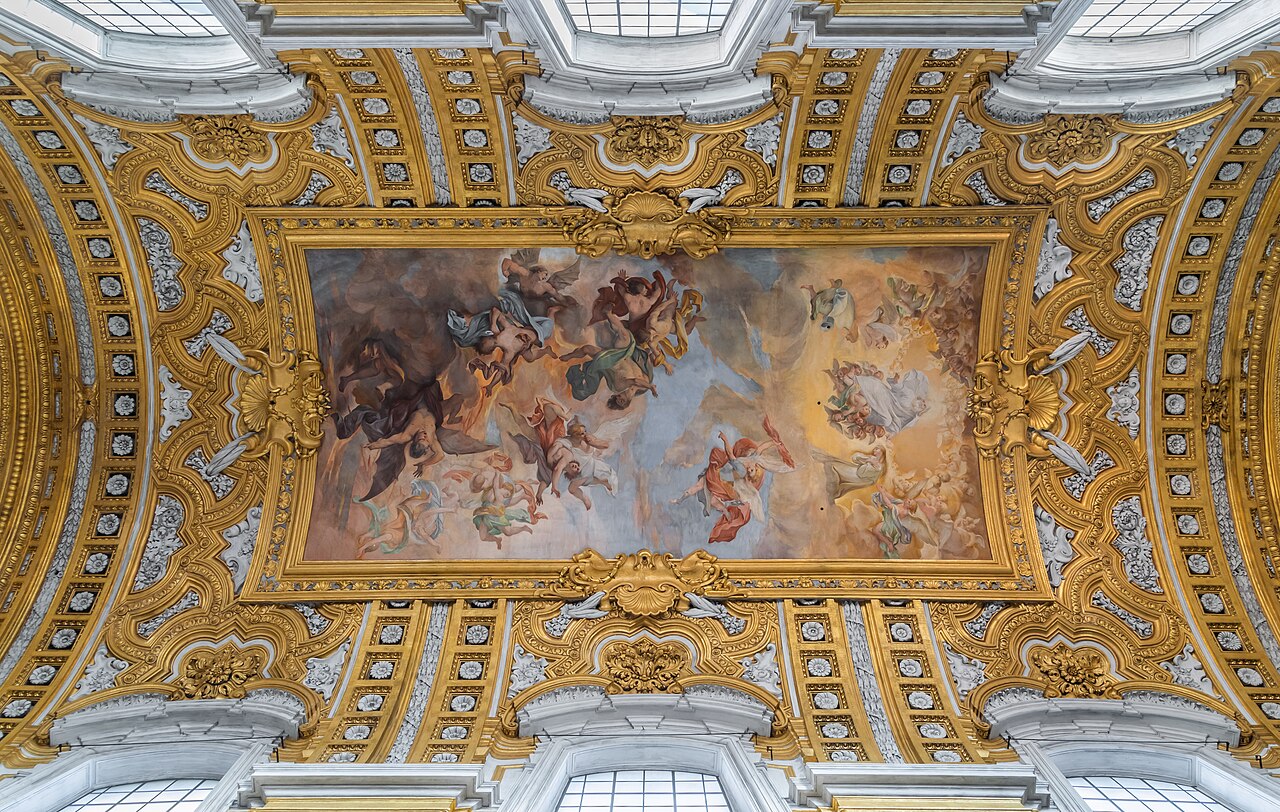


Eternal Father, I humbly adore Thee, and thank Thee for having created me, and for having redeemed me through Jesus Christ. I thank Thee most sincerely for having made me a Christian, by giving me the true faith, and by adopting me as Thy son, in the sacrament of baptism. I thank Thee for having, after the numberless sins I had committed, waited for my repentance, and for having pardoned (as I humbly hope) all the offences which I have offered to Thee, and for which I am now sincerely sorry, …
Read More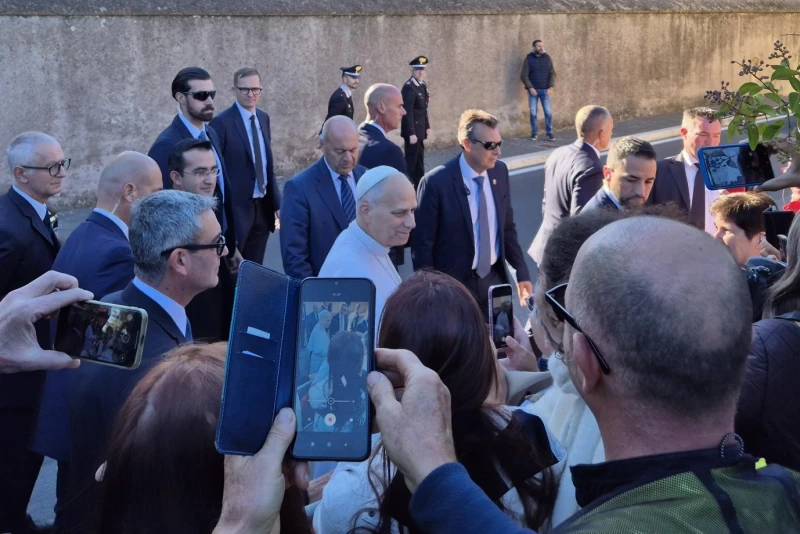

Castel Gandolfo, Italy, Oct 7, 2025 / 11:58 am (CNA).
Pope Leo XIV called Hamas’ attack on Israel on Oct. 7, 2023, an act of terrorism that cannot be tolerated and lamented the large number of Palestinian lives lost during “a painful two years.”
Addressing a group of journalists just outside his Castel Gandolfo residence, Villa Barberini, on Oct. 7, the pope said: “Two years ago it was a terroristic attack. … more than 200 people killed.”
“We really need to think hard about how much hatred there is in the world and start with ourselves, asking why it exists and what we can do about it,” he added. “Then, in two years, 60,000–67,000 Palestinians have been killed. It really makes you think about how much violence there is and how good it is to promote peace.”
Leo answered questions from journalists as he left Castel Gandolfo to return to the Vatican. He has spent every Tuesday at the papal retreat, located 18 miles south of Rome, since Sept. 9.
“It is certain that we cannot accept groups that cause terrorism; we must always reject this style of hatred in the world,” the pope said, noting as well that antisemitism is also on the rise.
He pointed out that he has asked the Church to pray in a special way for peace during the month of October.
“We must respect the dignity of everyone. This is the message of the Church,” he said.
The pope declined to answer a question about ICE raids in Chicago. “I prefer not to comment at this time about choices made, about political choices, in the United States,” he said.
In the three-and-a-half minute exchange with journalists, Leo also commented briefly on his first international trip to Turkey and Lebanon Nov. 27–Dec. 2, announced by the Vatican on Tuesday.
The visit to the historic site of Nicaea in Turkey for the 1,700th anniversary of the Council of Nicaea will be a “historic moment,” he said, “but it is not to look back, it is to move forward.”
He called it a moment “of unity in the faith for all Christians” and pointed out that his predecessor, Francis, was hoping to make the trip to Turkey himself.
In Lebanon, there will be “the opportunity to proclaim once again the message of peace in the Middle East, in a country that has suffered so much,” Leo said.
“Pope Francis wanted to go there too,” the pontiff added, “he wanted to reach out to the people who are living after the explosion, after all they have suffered. We will try to bring this message of peace and hope.”
Looking ahead to the Oct. 9 release of his first apostolic exhortation, Dilexi Te, which will be on the topic of poverty, Leo said, “that is the message of the Gospel.”
“Ultimately, whatever the pope says or announces must always be rooted in the Gospel. That is what we want to try to do,” he said.
This story was updated on Oct. 7, 2025, at 12:35 p.m. ET.
Read More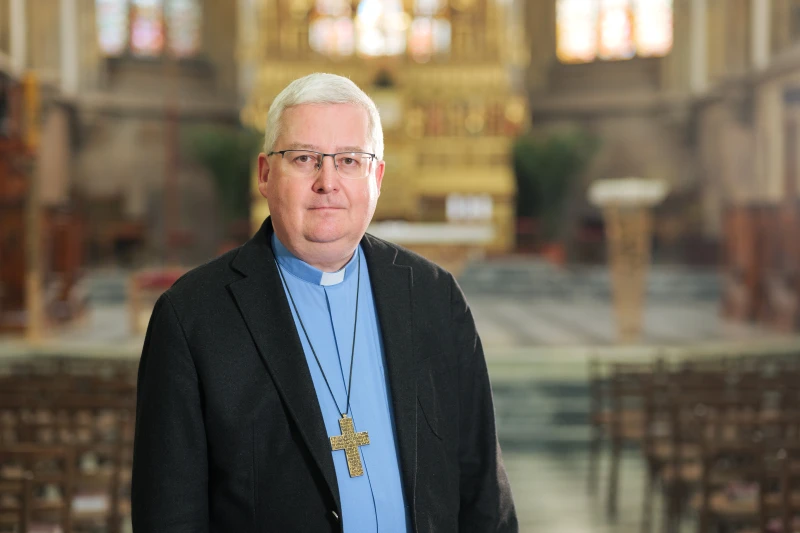

Rome, Italy, Oct 7, 2025 / 09:47 am (CNA).
Czech Catholic bishops welcomed the results of the parliamentary elections on Oct. 3–4, which saw a populist party win the most votes but fall short of a majority, while a far-left coalition that bishops had warned had an explicitly anti-church platform failed to enter Parliament.
The ANO 2011 party, led by billionaire former pime minister Andrej Babiš, won 35% of the vote, while the Stačilo! coalition, led by communists and proposing restrictions on religious freedom, received only 4.3%, below the 5% threshold needed to enter the Chamber of Deputies.
Archbishop Josef Nuzík of Olomouc, chairman of the Czech Bishops’ Conference, issued a statement congratulating Babiš and pledging to “pray for the newly elected legislators” so that “we can live in peace, mutual respect, and together strive for the well-being of our home.”
“I wish that our new parliamentary representatives would be able to build bridges, be sensitive to the weak and needy, honestly seek the truth, strive for understanding in society, and be ready to defend the rule of law and a just peace,” Nuzík stated.
The archbishop thanked citizens who participated in the elections and “showed interest in our common future.”
Bishop Pavel Konzbul of the Diocese of Brno told CNA that “the Czechs have rejected extremist parties, although both the far left and the far right had a strong campaign.”
“This is good news,” Konzbul said.
The bishop noted that a “slightly different course in foreign policy is to be expected, namely toward Ukraine and the EU.”
He said he is “curious to see how many of the numerous promises” the new government likely to be formed by ANO 2011 “will be able to fulfill, as promises were made to all groups of the population during the campaign.”
The outgoing government coalition SPOLU, formed by the parties ODS, TOP09, and the Christian Democrats (KDU-ČSL), received 23% of the vote, finishing second. The STAN party (Mayors and Independents) received 11%.
Other parties entering Parliament include the Czech Pirate Party, the SPD (Freedom and Direct Democracy), and the newcomer Motoristé sobě (Motorists for Themselves).
Turnout was almost 70% of eligible voters in a country of nearly 11 million people.
Stanislav Balík, dean of the faculty of social studies at Masaryk University in Brno and an independent senator, told CNA the results suggest the new government will likely “not be inclined to wider cooperation with Western states” and be “more friendly with Russia and less so toward Ukraine.”
However, the Czech political system “has checks and balances to prevent change from being rapid and absolute like the Senate, president, etc.,” Balík said.
The Czech Parliament consists of two chambers, the Senate and the Chamber of Deputies. Citizens voted for the Chamber of Deputies, which determines the composition of the government. The prime minister is the head of government, who is formed by a majority of political parties that enter the Chamber of Deputies after elections every four years. The president has a more representative function.
In the weeks leading up to the election, the Czech Bishops’ Conference issued a prayer novena and specifically warned about the threats to religious freedom posed by the Stačilo! coalition.
Archbishop Jan Graubner of Prague stated before the vote that he would not support populists, financially irresponsible politicians, or those who do not support Ukraine.
“Responsible people do not go into debt, and if they do, not for unnecessary things,” Graubner said.
He said he could not vote for politicians who want to leave the European Union and NATO, which the Czech Republic is part of, or for those who “spread hatred toward any group of people, (Ukrainians, Jews, people with a different orientation…).”
Graubner said he could not vote for the Stačilo! movement.
Konzbul told CNA that the far-left coalition “had an explicitly anti-church program.” The bishops issued a formal statement warning that the Stačilo! coalition had proposals to limit financing of Christian and private schools and to invalidate marriages celebrated in churches.
“It was for the first time the ČBK clearly named the choice of a specific party, and those who would like to cooperate with it, as evil,” Balík said.
Roman Joch, a political scientist who served as adviser to former prime minister Petr Nečas, told CNA that regarding religious freedom, “nothing bad happened, nothing got worse, it is very good as far as possible.”
“Andrej Babiš is a pragmatist who does not want to wage cultural wars against Christian civilization,” Joch said. He will not be pro-Russian as he is also a businessman with economic interests in the European Union, and not in Russia, Joch explained.
“The progressive Czech Pirate Party will be in opposition and have no chance to damage anything,” he added.
Alexander Tomský, a Jewish commentator and promoter of Catholic writer G.K. Chesterton, told CNA that the communists are “primarily concerned with benefits” and “would have little potential” to be invited into government.
The communists “cannot influence religious freedom or harm the Catholic Church either,” Tomský said.
He considers communism “a dead ideology” and thinks its representatives “will not enter the Chamber of Deputies again.”
For many years, the Communist Party of the Czech Lands and Moravia (KSČM) was present in Parliament but ran this election within the Stačilo coalition headed by Kateřina Konečná, a member of the European Parliament for KSČM.
Read More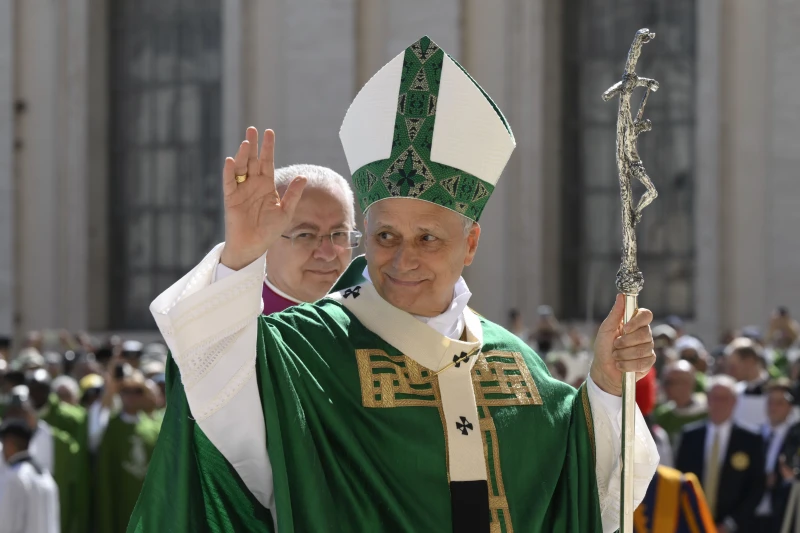

Vatican City, Oct 7, 2025 / 07:08 am (CNA).
Pope Leo XIV will visit Turkey and Lebanon in the first apostolic journey of his pontificate, to take place from Nov. 27 to Dec. 2, the Vatican announced Tuesday.
Holy See Press Office Director Matteo Bruni said the pope accepted the invitations of the “Head of State and Ecclesiastical Authorities” of both countries in an Oct. 7 statement released by the Vatican.
During the six-day papal trip, the Holy Father will visit the Turkish city of Iznek to mark the 1,700th anniversary of the Council of Nicaea, an ecumenical milestone in Church history that led to the formulation of the Nicene Creed.
According to a media release published by the Ecumenical Patriarchate on Tuesday, Pope Leo will undertake a joint pilgrimage with Orthodox Patriarch Bartholomew I of Constantinople to Nicaea on Nov. 28 before spending two days in the Phanar, the headquarters of the Ecumenical Patriarchate in Istanbul, where he and Bartholomew will celebrate the feast day of St. Andrew the Apostle on Nov. 30.
Leo will be the fifth pope to visit Turkey. Early in his pontificate, Pope Francis visited the Middle Eastern nation in 2014 to strengthen the Church’s interreligious dialogue with Orthodox and Muslim leaders.
The last papal visit to Lebanon was made by Pope Benedict XVI from Sept. 14–16, 2012, more than one year after the outbreak of the Syrian civil war.
The Assembly of the Catholic Patriarchs and Bishops in Lebanon issued a statement on Tuesday expressing their gratitude to Pope Leo for his “fatherly love and special concern” for the Lebanese people.
“We receive this historic event with great joy and renewed hope, praying this apostolic visit may bring Lebanon peace and stability, and that it may be a sign of unity for all Lebanese Christians and Muslims alike, in this delicate phase of our nation’s history,” the statement read.
Lebanese President Joseph Aoun said the pope’s visit will deepen the “unwavering trust” between Lebanon and the Vatican and a sign of peace in a country of diverse religions and cultures.
“All Lebanese — Christians and Muslims alike, from every sect and community — are preparing to receive him with sincere joy and rare national unity that reflects the true image of Lebanon,” Aoun said on Tuesday.
“Lebanon — its leadership and its people — looks to this visit with great hope at a time when challenges are growing on every level,” he added.
According to a 2024 UNHCR (U.N. refugee agency) report, Lebanon hosts the largest number of refugees per capita and per square kilometer in the world, including approximately 1.5 million Syrian refugees.
This story was updated on Oct. 7, 2025, at 9:19 a.m. ET.
Read MoreO God the Father of mankind, who hast given unto me these my children, and committed them to my charge to bring them up for Thee, and to prepare them for eternal life: help me with Thy heavenly grace, that I may be able to fulfil this most sacred duty and stewardship. Teach me both what to give and what to withhold; when to reprove and when to forbear; make me to be gentle, yet firm; considerate and watchful; and deliver me equally from the weakness of indulgence, and the excess of severity; …
Read More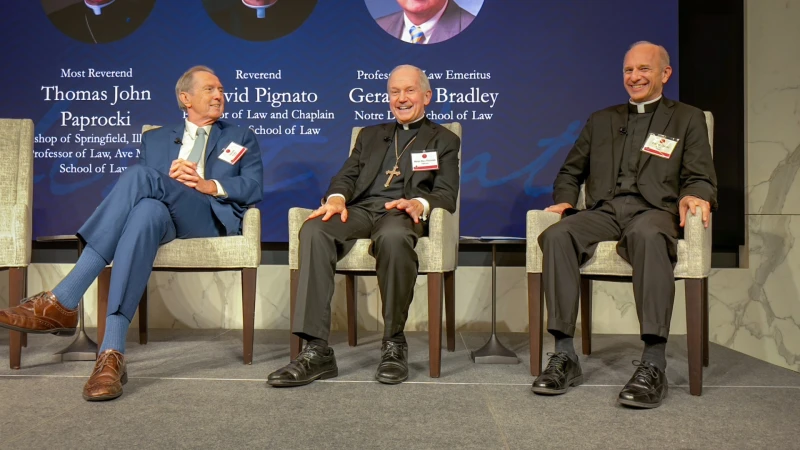

Washington, D.C. Newsroom, Oct 6, 2025 / 18:13 pm (CNA).
Bishop Thomas John Paprocki and other figures emphasized the importance of faith formation for Catholic lawyers and the role that Catholic law schools have in helping shape perspectives of soon-to-be lawyers.
“Law certainly follows values,” Paprocki said in a panel discussion at an Ave Maria School of Law conference on Oct. 3, hosted at the Heritage Foundation in Washington, D.C.
Paprocki — the bishop of Springfield, Illinois, and an adjunct professor at Ave Maria School of Law — said a person’s values, whether they come from theology or a secular notion of virtue, influence the way laws are crafted for all issues, including marriage or abortion.
For Catholic law schools, he said Scripture and doctrine “should be the basis for what we’re teaching” about values. He said values consistent with Church teaching should “influence the way we go about” addressing those issues.
Paprocki said he’s heard Catholics say they are “personally opposed to abortion” yet support legalized abortion. But he said he has never heard a person say he is “for open borders, but I don’t want to impose that belief on others.”
The bishop said faith formation for Catholic lawyers should ensure they have “a more robust understanding of the natural law,” as understood through Catholic social teaching. He said Christ instructs us to “go out and make disciples” and “not to be bashful about [our faith].”
Paprocki told CNA that in some contexts “you don’t necessarily have the opportunity to be very explicit” about matters of faith when employed as a lawyer, but “you should still be informed by your faith life.” Regarding lawmaking, he said “[you should] have religious principles that inform your [views] … and help shape what a policy should be.”
According to Paprocki, the nation’s founders saw the United States as a “religious country” to be informed by religious beliefs. He said that views informed by faith pose no threat to the First Amendment’s establishment clause, which prohibits “an establishment of religion.” The clause, he said, prohibits “an official church of the government.”
“That has been misinterpreted by some people to mean that you can’t mention God at all,” the bishop said.
Gerard Bradley, a retired Notre Dame law professor, said at the conference that the distinction between a secular law school and a Catholic law school ought to be that a Catholic school is “wed … not just to this truth or that truth, but the whole concept of truth.” He said a Catholic law school must reflect the view that Catholic doctrines “are truths that permeate everything we do.”
Lee Strang, executive director of Ohio State University’s Salmon P. Chase Center, spoke earlier in the day about the history of Catholic law schools in the United States, noting that they were initially created to advance the upward mobility of Catholic immigrants, bolster university reputations, and establish a culturally distinct law school.
Over time, he said some schools began to teach a more intellectually Catholic understanding of law rooted in Catholic law tradition, which is focused on “a Catholic theory of the human person within the context of law.”
Retired Loyola University Chicago law professor John Breen said modern Catholic law schools ought to ultimately be “directed toward worship of the Holy Trinity” with an understanding of human anthropology “that comes to us through the Church: the ‘imago Dei.’”
“You can’t understand the human person if you don’t also contemplate God,” Breen said.
He said alternative anthropologies lack an understanding of human exceptionalism and the soul, which distorts the understanding of law and emphasize an “atomized self” focused solely on “desire” or “choice.”
Ave Maria law professor Ligia Castaldi noted an understanding of natural law rooted in Catholic doctrine is important for discussions about the sanctity of life from the moment of conception until natural death.
Richard Myers, another law professor at the university, noted the importance of Catholic legal thought on the issue of same-sex civil marriage. He said in the wake of the Supreme Court’s ruling to legalize same-sex marriage nationwide, “[most] advocacy scholarship [was] on the wrong side of the issue.”
Catholic legal thought, he said, “served an important function, a corrective function … [that was] important to the debate on those issues at that time.”
Read More
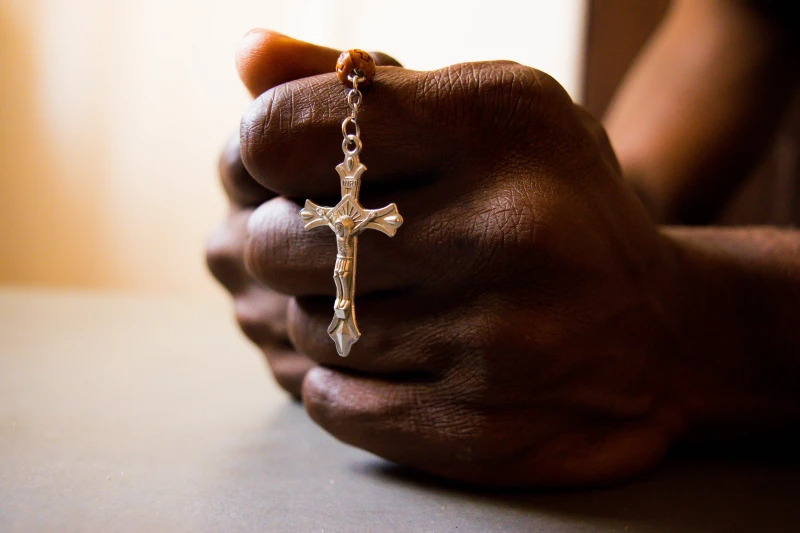

Washington, D.C. Newsroom, Oct 6, 2025 / 17:43 pm (CNA).
Members of Congress and the U.S. Commission on International Religious Freedom (USCIRF) are pushing to designate Nigeria as a country of particular concern (CPC) as religious persecution continues across the west African country.
Sen. Ted Cruz, R-Texas, introduced legislation in September that would require the Trump administration to adopt the CPC designation in addition to imposing targeted sanctions against Nigerian government officials who facilitate or permit jihadist attacks against Christians and other religious minorities.
Under the International Religious Freedom Act (IRFA) of 1998, the U.S president must designate countries that engage in or tolerate “particularly severe violations of religious freedom” as CPCs. Violations include torture, prolonged detention without charges, and forced disappearence, according to the State Department.
“Nigerian Christians are being targeted and executed for their faith by Islamist terrorist groups and are being forced to submit to sharia law and blasphemy laws across Nigeria,” Cruz said in a statement announcing a bill he named the Nigeria Religious Freedom Accountability Act of 2025.
“It is long past time to impose real costs on the Nigerian officials who facilitate these activities, and my Nigeria Religious Freedom Accountability Act uses new and existing tools to do exactly that,” Cruz said, adding: “I urge my colleagues to advance this critical legislation expeditiously.”
Republican Sens. Ted Budd of North Carolina, Pete Ricketts of Nebraska, Josh Hawley of Missouri, and James Lankford of Oklahoma endorsed redesignating Nigeria in a Sept. 12 letter sent to Secretary of State Marco Rubio that Budd posted on X.
Legislation is not likely to move forward until Congress settles an impasse over funding that has shut down the government for nearly a week. The State Department is expected to break its two-year moratorium on CPC designations later this year, likely in December.
The last CPC designations were made by Secretary of State Antony Blinken in December 2023, when Blinken revoked Nigeria’s CPC designation that was put in place by then-Secretary of State Mike Pompeo in 2020.
Rep. Chris Smith, R-New Jersey, introduced legislation in March calling for Nigeria’s redesignation “for engaging in and tolerating systematic, ongoing, and egregious violations of religious freedom.”
Similarly, the USCIRF also recommended the State Department designate Nigeria as a CPC in its latest update on religious freedom in the country in late July.
“Twelve state governments and the federal government enforce blasphemy laws, prosecuting and imprisoning individuals perceived to have insulted religion,” the USCIRF said in its report, adding: “Despite efforts to reduce violence by nonstate actors, the government is often unable to prevent or slow to react to violent attacks by Fulani herders, bandit gangs, and insurgent entities such as JAS/Boko Haram and the Islamic State West Africa Province (ISWAP).”
The latest congressional effort to bring about the designation comes as testimonies of Nigerians kidnapped by jihadist Fulani herdsmen have revealed that hundreds of Christians are still being held by the Islamist group in the infamous Rijana Forest in the southern part of Nigeria’s Kaduna state, ACI Africa, CNA’s news partner in Africa, reported on Oct. 1.
Read More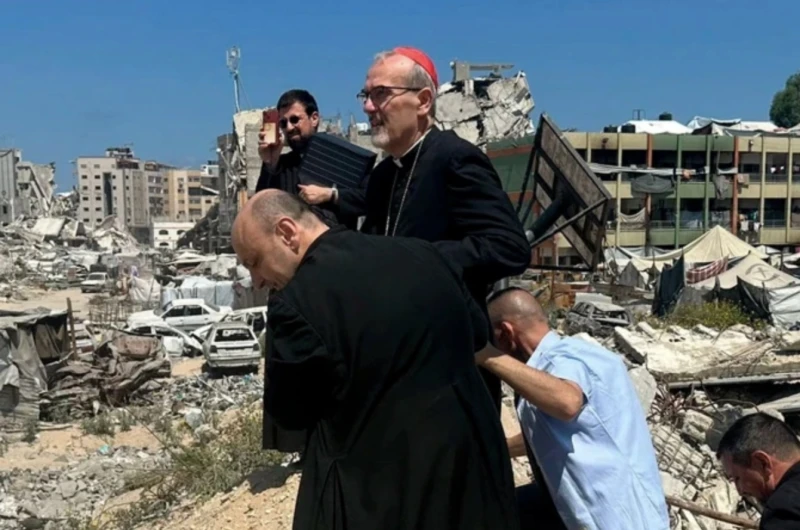

CNA Staff, Oct 6, 2025 / 17:13 pm (CNA).
Cardinal Pierbattista Pizzaballa, the Latin patriarch of Jerusalem, called the Israel-Hamas ceasefire deal brokered by the U.S. a “first step” toward peace.
In a statement, the terrorist group Hamas agreed to release the remaining Israeli hostages, living and dead, in the first steps of a peace deal brokered by U.S. President Donald Trump.
Twenty living hostages and the bodies of 28 dead hostages are believed to remain in Gaza as the second anniversary of the Oct. 7, 2023, Hamas attack — the largest massacre of Jews since World War II — approaches.
Pizzaballa called the ceasefire deal “an important and long-awaited first step” in an Oct. 4 letter to the faithful.
The 20-point plan includes deradicalizing Gaza into a terror-free zone that doesn’t “pose a threat to its neighbors” and redeveloping Gaza for the people of Gaza, as well as an immediate ceasefire, the return of the hostages, and the return of nearly 2,000 Gazan prisoners.
“If both sides agree to this proposal, the war will immediately end,” the plan reads. “Israeli forces will withdraw to the agreed-upon line to prepare for a hostage release. During this time, all military operations, including aerial and artillery bombardment, will be suspended, and battle lines will remain frozen until conditions are met for the complete staged withdrawal.”
Delegations from the U.S., Israel, Hamas, and some Middle Eastern countries met on Monday in Egypt for peace talks.
“Nothing is entirely clear or definite yet; many questions remain unanswered, and much still needs to be defined,” Pizzaballa said. “We must not delude ourselves, but we are pleased that something new and positive is on the horizon.”
The first phase of the ceasefire would include the logistics of the hostage release, followed by a plan to create a Palestinian “technocratic, apolitical” leadership in Gaza that is not Hamas, according to U.S. Secretary of State Marco Rubio.
“We await the moment to rejoice for the families of the hostages, who will finally be able to embrace their loved ones,” Pizzaballa said. “We hope the same for Palestinian families, who will be able to embrace those returning from prison. We rejoice above all for the end of hostilities, which we hope will not be temporary and will bring relief to the inhabitants of Gaza.”
“We don’t know if this war will truly end, but we do know the conflict will continue because its root causes have yet to be addressed,” Pizzaballa said.
“The end of war does not necessarily mark the beginning of peace, but it is the first essential step toward building it,” Pizzaballa continued.
Pizzaballa reflected on hope for the Easter resurrection amid the war.
“Anger, resentment, distrust, hatred, and contempt too often dominate our discourse and pollute our hearts,” Pizzaballa said. “We risk becoming accustomed to suffering, but it need not be so. Every life lost, every wound inflicted, every hunger endured remains a scandal in God’s eyes.”
“The dominant narrative of recent years has been one of clash and reckoning, inevitably leading to the deeply painful reality of polarization,” Pizzaballa continued. “As a Church, reckoning does not belong to us, either as logic or as language. Jesus, our teacher and Lord, made love that becomes gift and forgiveness his life’s choice.”
“His wounds are not an incitement to revenge but a sign of the ability to suffer out of love,” he said.
Read MoreO Good Saint Anne,
who had the incomparable privilege of bringing into the world
Her who was to become the Mother of God,
I come to place myself
under your special care.
I confide myself to you,
together with the child I am carrying.
Thousands of children owe you,
Glorious Mother of Mary,
the life of the body and the grace of baptism.
Hence I wish, in my turn,
to place my whole confidence in you.
Make me keep in mind the precautions I need to take
so as not to …
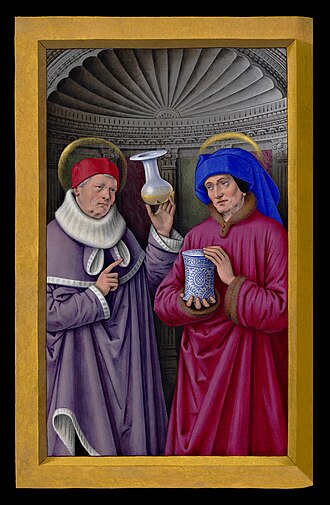
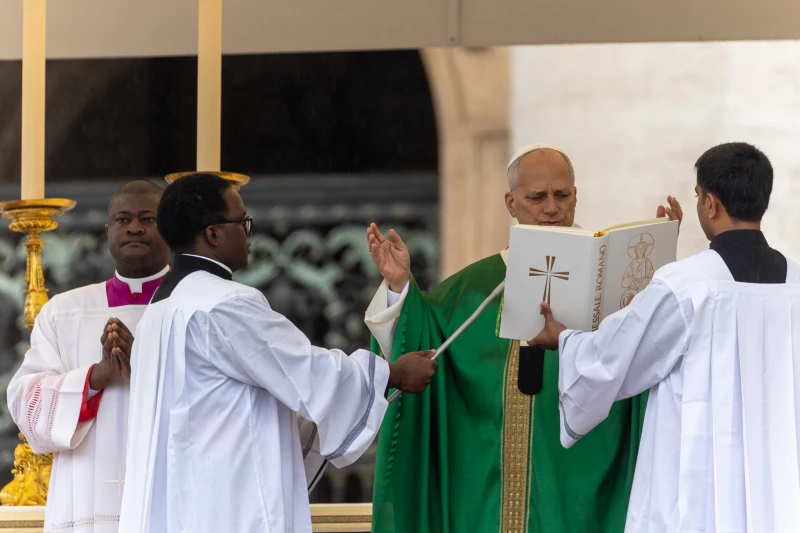

Vatican City, Oct 5, 2025 / 07:50 am (CNA).
Pope Leo XIV on Sunday condemned the resurgence of antisemitic hatred and appealed for renewed commitment to peace in the Middle East, while also assuring prayers for victims of a devastating earthquake in the Philippines.
“I express my concern about the rise of antisemitic hatred in the world, as unfortunately we saw with the terrorist attack in Manchester a few days ago,” the pope said from St. Peter’s Square, before leading the Angelus prayer. He added that he “continue[s] to be saddened by the immense suffering of the Palestinian people in Gaza.”
The pope said that “in the dramatic situation in the Middle East, some significant steps forward have been taken in peace negotiations,” and urged all leaders “to commit themselves to this path, to bring about a ceasefire and to release the hostages.” He also invited the faithful “to remain united in prayer, so that the ongoing efforts may put an end to the war and lead us towards a just and lasting peace.”
Turning to the Philippines, where a strong earthquake struck the central region on Sept. 30, Pope Leo expressed closeness “to the dear Filipino people,” and said he prays “for those who are most severely affected by the consequences of the earthquake.” “Faced with any danger,” he added, “let us remain united and supportive in our trust in God and in the intercession of our Blessed Mother.”
The pope invited Catholics to join spiritually with those gathered at the Shrine of Our Lady of the Rosary in Pompeii, for the traditional Supplication held each October. “In this month of October, as we contemplate with Mary the mysteries of Christ our Savior, let us deepen our prayer for peace: a prayer that becomes concrete solidarity with those people tormented by war,” he said. “Thank you to the many children around the world who have committed themselves to praying the Rosary for this intention. You have our heartfelt thanks!”
Pope Leo also greeted participants in the Jubilee for missionaries and migrants, thanking them for their witness. “The Church is entirely missionary and is one great people journeying towards the Kingdom of God,” he said. “But no one should be forced to flee, nor exploited or mistreated because of their situation as foreigners or people in need! Human dignity must always come first.”
Earlier that morning, the pope celebrated Mass for the Jubilee of the Missionary World and the Jubilee of Migrants in St. Peter’s Square, inviting Catholics to renew their missionary vocation through compassion and welcome.
“Today we celebrate the Jubilee of the Missions and of Migrants,” he began. “This is a wonderful opportunity to rekindle in ourselves the awareness of our missionary vocation, which arises from the desire to bring the joy and consolation of the Gospel to everyone, especially those who are experiencing difficult and painful situations.”
Recalling the prophet Habakkuk’s lament — “O Lord, how long shall I cry for help, and you will not hear?” — the pope said that faith transforms lives and “makes of them an instrument of the salvation that even today God wishes to bring about in the world.” True faith, he said, “does not impose itself by means of power and in extraordinary ways,” but “carries within it the strength of God’s love that opens the way to salvation.”
Pope Leo said the missionary calling today means responding to suffering close at hand as well as far away. “If for a long time we have associated with mission the word ‘depart’ … today the frontiers of the missions are no longer geographical, because poverty, suffering and the desire for a greater hope have made their way to us,” he said.
“Those boats which hope to catch sight of a safe port, and those eyes filled with anguish and hope seeking to reach the shore, cannot and must not find the coldness of indifference or the stigma of discrimination!” he warned. “Mission is not so much about ‘departing’, but instead ‘remaining’ in order to proclaim Christ through hospitality and welcome, compassion and solidarity.”
The pope encouraged renewed cooperation among Churches, noting that migration from the Global South can “renew the face of the Church and sustain a Christianity that is more open, more alive and more dynamic.” He also called for “new missionary effort by laity, religious and priests who will offer their service in missionary lands,” especially in Europe.
Concluding, Pope Leo offered his blessing “to the local clergy of the particular Churches, to missionaries and those discerning a vocation,” and told migrants, “know that you are always welcome!”
Throughout his homily and his Angelus address, Pope Leo returned to a single message: faith expressed in prayer, compassion, and hospitality remains the seed of peace — whether in war-torn regions, along migration routes, or in the hearts of those who choose to welcome others.
Read More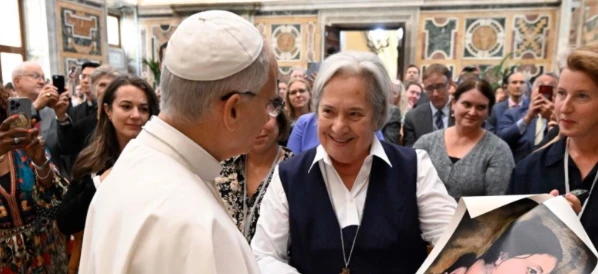

Vatican City, Oct 5, 2025 / 07:00 am (CNA).
Sister Norma Pimentel is known as “the immigrants’ nun.” For over a decade, she has directed the Catholic Charities of the Rio Grande Valley (CCRGV) Humanitarian Respite Center, a humanitarian aid center located in McAllen, Texas, on the border with Mexico. From there, she has provided assistance to people who arrive in the United States seeking asylum.
According to Pimentel, the increase in arrests by U.S. Immigration and Customs Enforcement (ICE) to expel immigrants who lack legal status in the country has unleashed a climate of fear in communities.
“People are extremely afraid … they know that nowhere is safe, they pick you up anywhere, and you can’t even go to the supermarket because raids are taking place everywhere,” the religious explained.
Last year, the center received a legal request from the Texas attorney general’s office to compel a CCRGV representative to sit for a deposition regarding its immigrant assistance efforts, although the case was subsequently dismissed by a judge.
Pimentel said the sense of widespread fear has also spread to other residents of the Rio Grande Valley. Many now think: “If I help him, maybe something will happen to me too,” she told ACI Prensa, CNA’s Spanish-language news partner, shortly after participating in the Oct. 2 “Refugees and Migrants in Our Common Home” conference with Pope Leo XIV at the Vatican.

The initiative, part of the Jubilee of Migrants, is the first global meeting promoted by the Vatican to bring together religious institutions, nongovernmental organizations (NGOs), and experts dedicated to addressing the challenges of migratory flows.
At the meeting, the pontiff asked all of the participants to promote a culture of “reconciliation and hope” to address the “urgent challenges” of migration.
“The Holy Father strongly affirms that immigrants are human beings who must be recognized and treated with dignity. Therefore, you can’t say you’re pro-life if you don’t defend the lives of human beings and immigrants,” Pimentel pointed out.
Every so often, dozens of exhausted people knock on her door, their bodies reflecting the consequences of a hellish journey. Most travel hundreds of miles on foot to reach the U.S.-Mexico border.
Pimentel, a sister of the Missionaries of Jesus, who works side by side with the bishop of Brownsville, Daniel Flores, always greets them with a warm welcome: “We are right on the border, there with the immigrants, with the migrant families, who are truly part of our Church.”
“We are very versed in how to be present, how to speak and encourage people to be good neighbors, to help each other, to not feel afraid that the government won’t allow us to live our religion, our faith, and to be present to help people when they need it,” she explained.
The most important thing is “that they don’t feel abandoned and alone” and that they realize that, despite the growing hostility, “they do matter in this life.”
This total commitment is born from the conviction that every person who suffers bears the face of Christ. In any case, Pimentel doesn’t hide the fact that she sometimes feels overwhelmed. “We don’t have enough resources,” she lamented.
She’s also convinced that giving these migrants a face and sharing the horror stories they endure is the best antidote to society being fed up with immigrants: “When I see a crying child who comes up to me and says, ‘Help me,’ with tears streaming down his face, [I want] to be able to share that with other people. That way, people can feel that pain, the cries of that child or that mother who is scared and afraid of how to protect her children.”
That’s why she never misses an opportunity to make known the pain of these people because “when you get close to a human being who is suffering, your heart connects and you change.”
This story was first published by ACI Prensa, CNA’s Spanish-language news partner. It has been translated and adapted by CNA.
Read MoreMost High, all-powerful, all-good Lord,
All praise is Yours, all glory, all honour and all blessings.
To you alone, Most High, do they belong,
and no mortal lips are worthy to pronounce Your Name.
Praised be You my Lord with all Your creatures,
especially Sir Brother Sun,
Who is the day through whom You give us light.
And he is beautiful and radiant with great splendour,
Of You Most High, he bears the likeness.
Praised be You, my Lord, through Sister Moon and the stars, …
Read More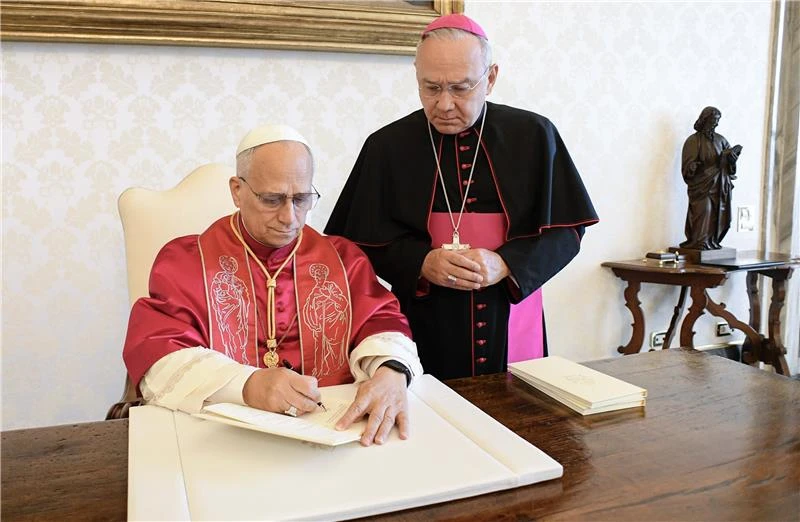

CNA Staff, Oct 4, 2025 / 14:39 pm (CNA).
Pope Leo XIV on Oct. 4 signed the first apostolic exhortation of his pontificate, the text of which is expected to be released next week.
The Vatican said in a press release that Leo signed the exhortation “Dilexi te” in the library of the Apostolic Palace. The Holy See did not reveal the text of the document, which it said will be presented on Oct. 9 by the Holy See Press Office.
The focus of the document was also not officially announced, though it is reportedly expected to focus on the poor. It was signed on the feast of St. Francis of Assisi.
On the morning of Saturday, October 4, the Holy See Press Office announced that Pope Leo XIV signed his first Apostolic Exhortation, Dilexi te, at 8:30 a.m. in the private library of the Apostolic Palace.
The signing took place in the presence of Archbishop Edgar Peña Parra,… pic.twitter.com/gJnEkNrbRs
— EWTN Vatican (@EWTNVatican) October 4, 2025
The signing of the document took place in the presence of Archbishop Edgar Peña Parra, Substitute for General Affairs of the Secretariat of State, the Vatican said.
Read More

CNA Staff, Oct 4, 2025 / 13:05 pm (CNA).
Pope Leo XIV on Saturday attended the swearing-in of the Swiss Guard at the Vatican, the first time a pope has attended the pomp-filled ceremony since the pontificate of Pope Paul VI in 1968.
The event took place in the Vatican’s San Damaso Courtyard. The Holy Father was joined by a crowd of spectators watching as the 27 new members were sworn into the ranks of the papal guard.
The swearing-in ceremony, when the new guards promise to protect the pope, if necessary with their lives, was postponed from the traditional date of May 6 due to the conclave that saw Leo elected.




The pope met the recruits and their families at the Apostolic Palace on Oct. 3, ahead of the swearing-in ceremony.
“From the first steps of my pontificate, dear Swiss Guards, I have been able to count on your faithful service,” the pope said on Oct. 3.

“The successor of Peter can fulfill his mission in service to the Church and the world in the certainty that you are watching over his safety,” he added.
He encouraged the new guards to draw inspiration from the stories of the first Christian martyrs in Rome to deepen their relationships with Jesus and to cultivate their interior lives “amid the frenzy of our society.”
Read More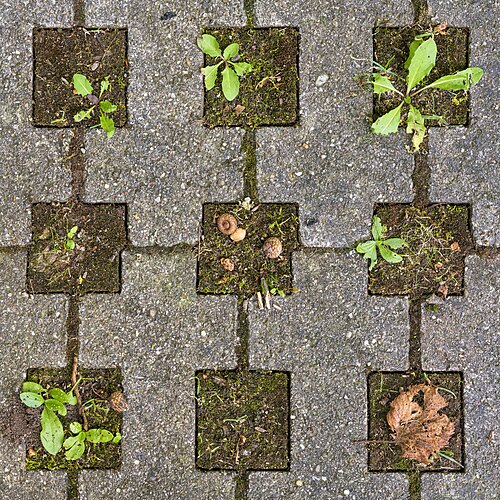
| Picture of the day |
|---|
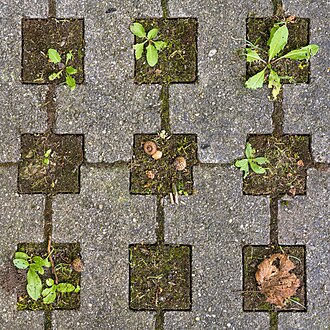
|
|
Concrete paving with gaps in the parking lot of the city cemetery of Waldenbuch, Germany
|
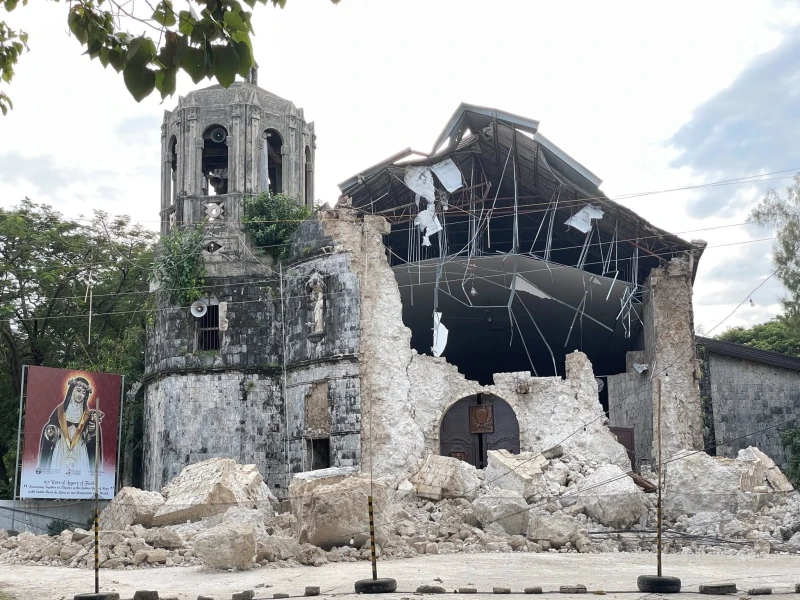

CNA Staff, Oct 4, 2025 / 11:15 am (CNA).
Catholic aid agencies in coordination with local dioceses and authorities are spearheading efforts to assist people affected by a major 6.9 magnitude earthquake that struck Cebu, central Philippines this week.
Caritas Philippines, the humanitarian, development, and advocacy arm of the Catholic Bishops’ Conference of the Philippines, is at the forefront of relief efforts in the affected areas.
“In the spirit of mercy, solidarity, and fraternal cooperation among Caritas Philippines’ network, we stand with the people of Cebu,” Jeanie Curiano, the humanitarian head of Caritas Philippines, told CNA on Oct. 3.
“We are committed to supporting them, putting the affected communities at the center of our work — in rebuilding lives with dignity and hope,” she added.
On Sept. 30 a strong earthquake with a magnitude of 6.9 hit Cebu and surrounding provinces. Its epicenter was located 19 kilometers northeast, offshore of Bogo City.
More than 300 recorded aftershocks were felt. The Philippine Institute of Volcanology and Seismology subsequently issued a tsunami alert.
The Office of Civil Defense confirmed as many as 68 deaths following the earthquake.
The earthquake has reportedly impacted more than 80,595 families and around 366,360 people, with aftershocks forcing many to sleep outside in unsafe conditions. Homes, schools, and parish buildings in Cebu have suffered severe damage, with electricity, water supply, and telecoms still unavailable.
There were reportedly 1,795 individuals staying in eight evacuation centers, while 75,227 others were temporarily staying outside of their homes due to fear of aftershocks.
Caritas Philippines has begun relief efforts, sending rice, drinking water, and shelter repair kits, while rapid assessment teams coordinate next steps.
According to the volcano institute, the earthquake in Bogo City is the strongest ever recorded in northern Cebu. It has affected 47,221 families and displaced 20,000 individuals there, Philippine officials said.
The United Nations Office for Disaster Risk Reduction, meanwhile, reported the discovery of sinkholes in several locations.
The earthquake partially collapsed or damaged at least five churches in Cebu.
Parts of the centuries-old Archdiocesan Shrine of Santa Rosa de Lima in Daanbantayan fell during the earthquake. Notably, the retablo picture of Santa Rosa de Lima, the city’s patron saint, was completely unharmed.
The Parroquia de San Pedro Apostol Church on Bantayan Island urged people to stay away from its property after debris fell in front of the church.
Some of the walls and ceilings in St. Martin de Porres Parish at Tabogon fell, while the earthquake broke an image of the Blessed Virgin Mary and made cracks appear in the bell tower of San Sebastian Martyr Parish in Borbon.
The San Juan Nepomuceno Parish in San Remegio reported that several holy images have fallen, and there is clear damage inside the church.
Archbishop Alberto Sy Uy of Cebu instructed his staff to inspect the structures of churches and rectories. He also instructed parishes in northern Cebu to refrain from holding Mass in the churches until they are considered safe.
In the aftermath of the earthquake, Caritas Philippines in Manila, the country’s capital, quickly activated the Emergency Operations Center at the national level and has been monitoring the ongoing situation in Cebu and nearby dioceses. Caritas Cebu deployed an assessment team to the most affected areas, awaiting initial findings and data.
Immediate needs include emergency shelter, food and clean water, medical aid and trauma support, restoration of electricity and communication, debris clearing, and road access.
On Oct. 1, Archbishop Uy visited the affected communities to provide pastoral support and check damage to parish structures. A local appeal was issued for emergency support through the Adopt-a-Parish strategy. Other dioceses also launched local appeals to support response operations.
Caritas Philippines is preparing to launch a local emergency appeal through the Alay Kapwa Solidarity Fund, a flagship program of Caritas Philippines, to support the immediate needs of the most affected communities in Cebu.
Besides Caritas Philippines’ involvement with relief, the Commission on the Laity of the Archdiocese of Cebu has begun providing immediate help like food, water, and hygiene kits, among others.
Fe Mantuhac Barino, who chairs the Commission on the Laity for the Archdiocese of Cebu, told CNA: “People’s donations have been delivered to the earthquake-affected families in the north of Cebu, bringing not just material support but also the comforting presence of our faith community.”
She thanked all supporters for living out the Gospel through their generosity.
The Archdiocese of Cebu, in partnership with LH Foundation Inc., launched “Hatag Paglaum” (Give Hope) to provide humanitarian aid.
“The Hatag Paglaum invites us to become living instruments of Christ’s love,” said Uy. “After the earthquake, many brothers and sisters have lost homes, churches, and livelihoods. What they need most is hope.”
“When we give help, we do not just share food, clothing, or money; we share Christ himself, for he is our true hope,” he added. “Every gift we extend becomes a sign of His presence, reminding the needy that they are not forgotten and that God walks with them.”
On Oct. 2, President Ferdinand Marcos Jr. visited some affected areas of Cebu and held discussions with government agencies.
Also on Oct. 2, Cebu Archbishop Uy said that Pope Leo XIV prayed and offered his condolences to the victims.
Leo also assured his spiritual closeness to people as they grieve over the loss of lives and move on to recovery.
Apostolic Nuncio to the Philippines Archbishop Charles John Brown informed Uy that the pope expressed his “sympathies for all the survivors of the earthquake and his prayers for the eternal repose of the victims.”
Meanwhile, the Catholic Bishops’ Conference of the Philippines has announced a “National Day of Prayer and Public Repentance” to be observed nationwide on Oct. 7.
Read More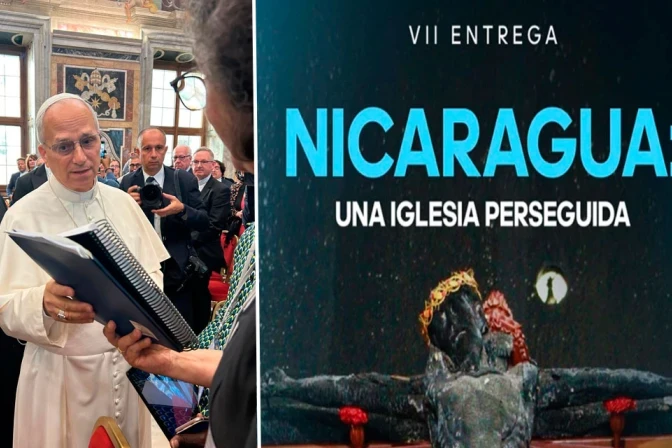

ACI Prensa Staff, Oct 4, 2025 / 09:00 am (CNA).
Pope Leo XIV this week received the report “Nicaragua: A Persecuted Church” by researcher Martha Patricia Molina, which details the prohibition of more than 16,500 processions and acts of piety as well as more than 1,000 attacks against the Catholic Church by the dictatorship of President Daniel Ortega and his wife and vice president, Rosario Murillo.
Activist Muriel Sáenz, a Nicaraguan by birth who fled the dictatorship in the 1980s and now works to help immigrants in the United States, presented Molina’s report to Pope Leo on Oct. 2 during the Holy Father’s audience with participants in a Vatican conference on migrants and refugees.
“I am happy to know that my friend Muriel Sáenz has personally delivered to Pope Leo XIV the study ‘Nicaragua: A Persecuted Church,’ which is an expression of the Catholic Church and the Nicaraguan people that reflects the persecution of bishops, priests, and laypeople by the Sandinista dictatorship,” Molina told ACI Prensa, CNA’s Spanish-language news partner.
🇻🇦🇳🇮Registros de la brutal persecución religiosa en Nicaragua, fue entregado en manos del Vicario de Cristo, su santidad el Papa Leon XIV.
El estudio Nicaragua ¿Una iglesia Perseguida de la doctora @mpatricia_m fue entregado por Miurel Saenz de Nicaragüenses en el mundo. pic.twitter.com/wloMQsIM9F
— Panorama Católico Nicaragua (@panoramacatolic) October 2, 2025
“The repression continues daily, and it is important that the Holy See knows that everything is being documented,” she stated.
Molina said she also sent Leo XIV a letter stating that the Catholic Church in Nicaragua is “in total communion with the pope and united in prayer despite the adversity and repression.”
Sáenz, founder of Nicaraguans in the World Texas, Inc., an organization that helps people present their asylum cases before immigration courts in the U.S., told ACI Prensa that she also presented Leo with letters from victims of the dictatorship, including priests, and gave him Nicaraguan coffee.
“I hope the pope continues his support in the global denunciation [of the dictatorship], since remaining silent only allows criminals to continue causing more and more harm. My intention is also for the world to learn about what is happening in Nicaragua, where the criminals who make people call them president and co-president have an entire country — which has no weapons to defend itself — in their hands,” Sáenz said.
“If one does not obey their absurd demands, one is shamelessly imprisoned in inhumane conditions, enduring degrading treatment and torture. Priests and laypeople are not exempt from such treatment. I am sure that if we manage to force [the regime] to leave, the more than 1 million Nicaraguans scattered around the world would return tomorrow,” she added.
On Aug. 23, Pope Leo XIV received three bishops in an audience at the Vatican: Bishop Silvio Báez, who was confirmed by the Holy Father in his position as auxiliary bishop of Managua, although he has been in exile since 2019; Bishop Isidoro Mora of Siuna; and Bishop Carlos Herrera, president of the Nicaraguan Episcopate, who is in exile in Guatemala.
“He encouraged me to continue my episcopal ministry and confirmed me as auxiliary bishop of Managua. I sincerely thank him for his fraternal welcome and his encouraging words,” said Báez, who currently resides in the United States, regarding his meeting with the pope.
The seventh edition of the report “Nicaragua: A Persecuted Church” was released on Aug. 27.
Molina explained that the ban on processions has been intensified since 2022 and that the dictatorship imposed this measure annually throughout the country, but the report does not consider all parish churches or chapels, which number 400 in Managua alone.
“So the figure presented in the study could be at least three or four times higher than what is being recorded,” she pointed out.
In an interview with the Spanish-language edition of EWTN News, Molina explained that so far in this year alone, 32 attacks against the Church by the dictatorship have been recorded, a figure that could be much higher, considering the increasing control of the Ortega-Murillo government.
“There is constant surveillance of priests and bishops. Some of them are even followed 24 hours a day,” Molina said, adding: “The clergy meetings held by bishops with priests continue to be constantly monitored by the police, who take photographs and videos of the religious who attend.”
This story was first published by ACI Prensa, CNA’s Spanish-language news partner. It has been translated and adapted by CNA.
Read MoreMost High, Glorious God,
enlighten the darkness of our minds.
Give us a right faith, a firm hope and a perfect charity,
so that we may always and in all things act according to Your Holy Will. Amen.
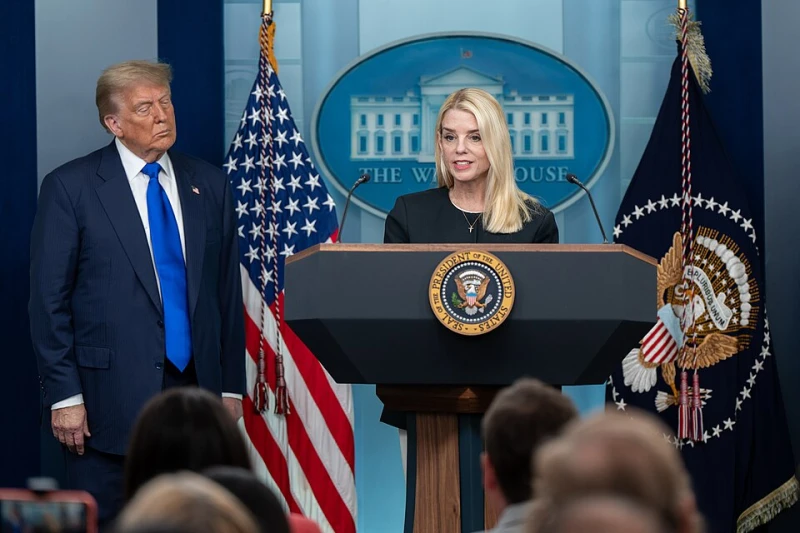

Washington, D.C. Newsroom, Oct 3, 2025 / 17:53 pm (CNA).
President Donald Trump’s Department of Justice (DOJ) filed a lawsuit against individuals and entities that staged a protest outside of a New Jersey synagogue, which officials say descended into violence.
The DOJ named two organizations involved in the protest — Party for Socialism and Liberation New Jersey and American Muslims for Palestine New Jersey — as well as six individuals who allegedly participated in the protest as defendants in the lawsuit.
The lawsuit was brought under the Freedom of Access to Clinic Entrances (FACE) Act, which imposes federal penalties on people who restrict access to places of worship. The DOJ alleges protesters used threats, intimidation, and violence while protesting the Congregation Ohr Torah synagogue, which interfered with the community’s right to exercise its religion.
“No American should be harassed, targeted, or discriminated against for peacefully practicing their religion,” Attorney General Pamela Bondi said in a statement on Sept. 29.
“Today’s lawsuit underscores this Department of Justice’s commitment to defending Jewish Americans — and all Americans of faith — from those who would threaten their right to worship,” she added.
The DOJ allegations contrast with the assertions of local prosecutors who allege that pro-Israel counterprotesters initiated the violence.
The DOJ lawsuit notes the planned protest coincided with the synagogue’s religious memorial service for the late Rabbi Avi Goldberg. It notes the event included a Torah sermon, religious songs, prayerful dancing, a festive barbecue, and a real estate fair, all of which were “part of the religious observance.”
Protesters rallied outside the event primarily in opposition to the real estate fair, which included the sale of land in the Palestinian West Bank that was obtained through settlements authorized by the Israeli government. The United Nations’ International Court of Justice issued an advisory opinion last year that declared those settlements illegal under international law.
The DOJ lawsuit alleges that protesters defied police orders and entered synagogue property “shouting and blowing vuvuzelas.” It alleges they “disrupted the religious event by blowing vuvuzelas to drown out the memorial service and Torah sermon.”
It alleges two protesters blew vuvuzelas in the face of an event organizer, which the organizer swatted away. One protester allegedly charged toward the event organizer in response, which led a second worshipper to pepper-spray the protester to halt the alleged attack.
According to the allegations, that protester attacked the person who pepper-sprayed him by throwing the man to the ground, dragging him to the parking lot, and slamming his head onto the ground.
As the assault allegedly continued, the worshipper eventually hit the protester in the head with a flashlight and escaped to safety, according to the lawsuit.
“This Justice Department will vigorously enforce the right of every American to worship in peace and without fear,” Assistant Attorney General Harmeet K. Dhillon said in a statement. “Those who target houses of worship and violate our federal laws protecting people of faith are on notice that they will face the consequences.”
The DOJ’s interpretation of the events conflicts significantly with that of the local prosecutors.
According to an article from the North Jersey Media Group, Essex County prosecutors allege that “pro-Israel counterprotesters” launched the attack on the pro-Palestinian protesters. The prosecutors allege pro-Israel counterprotesters “stormed toward the pro-Palestinian protesters and began ripping away their materials.”
The event organizer and the other worshipper — whom the DOJ states were the victims — faced several charges in Essex County for their alleged roles in the conflict. They were charged with bias intimidation, aggravated assault, possession of a weapon for an unlawful purpose, and unlawful possession of a weapon, according to the article.
According to an article by the New Jersey Monitor, the event organizer maintains his innocence and his lawyer said the DOJ interpretation of events “recounts what occurred on that tragic day [and] we are gratified that finally the people who deserve to be brought to justice will be.”
Muslim Legal Fund of America, which is representing American Muslims for Palestine (AMP), said in a statement that the complaint “contains no allegations of violence on the part of any representative of AMP.”
“AMP continues to stand up for the rights of all to lawfully exercise peaceful First Amendment-protected free speech,” the statement added.
In addition to establishing special protections for houses of worship, the FACE Act also provides similar protections for abortion clinics and pro-life pregnancy resource centers.
Read More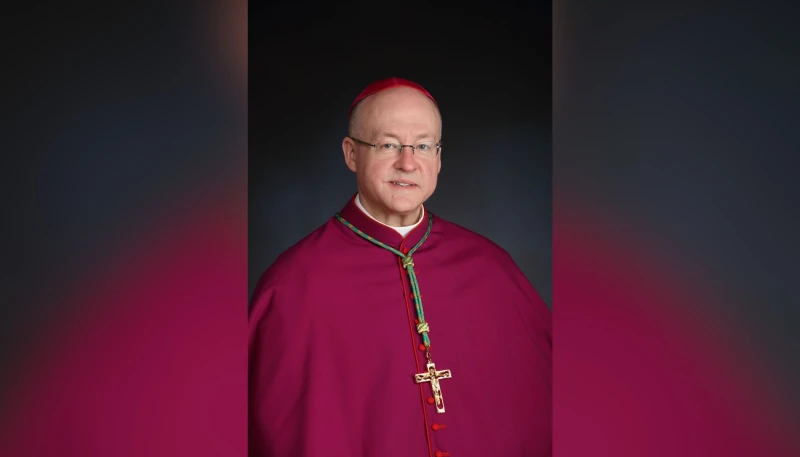

Washington, D.C. Newsroom, Oct 3, 2025 / 17:16 pm (CNA).
Archbishop Jeffrey Grob of Milwaukee said he would consider granting dispensation from Mass obligations to migrants fearing deportation if the situation worsens in his archdiocese, according to a spokesperson.
Sunday Mass dispensations for migrants became a “discussion point” with Grob and south side pastors in Milwaukee, the archbishop said at the Milwaukee Press Club’s Oct. 2 Newsmaker Luncheon, the Milwaukee Journal Sentinel reported.
Sandra Peterson, spokesperson for Grob, said “at this point there are no plans to make that decision” regarding lifting the Sunday Mass obligation. The Nashville Diocese was the first to lift the obligation in May, while the Diocese of San Bernardino lifted the obligation in July following immigration enforcement activities.
Peterson said there have not been reported incidents of ICE enforcement on church grounds in Milwaukee, telling CNA “there have not been any incidents that we are aware of” and that the archdiocese “will continue to monitor the situation and pray that [a dispensation] does not become necessary.”
During the Newsmaker Luncheon, Grob said “things have continued to deteriorate” since February, when the Wisconsin bishops released a letter calling for human dignity to be upheld regarding immigration enforcement. As a result, Grob said pastors began discussing dispensations and are waiting “to see if the situation escalates,” the Journal Sentinel reported.
“In U.S law, every person, regardless of immigration status, has certain fundamental human rights, which can never be infringed,” the bishops said in the February letter. “All people have the right to religious freedom to attend church services and to receive sacraments and pastoral care.” The bishops further acknowledged that “while the Catholic Church always welcomes the stranger, she also recognizes the right of nations to regulate immigration for the sake of the common good.”
Earlier Bishop Alberto Rojas of San Bernardino, California, granted a dispensation from Sunday Mass to members of his flock who possess “genuine fear” of deportation.
The move by Rojas came after attendance for Spanish-language Masses across the diocese had been “down about 50%” since immigration enforcement raids began to escalate in Southern California in June, according to the diocese.
John Andrews, director of communications for the diocese, told CNA at the time that the diocese was aware of two instances of ICE enforcement actions on church properties, which both took place on June 20.
One of the instances, he said, occurred at St. Adelaide Church in Highland and “involved several men who had been working in the neighborhood where the church is located.” The men were chased into the church parking lot and detained, according to Andrews, who said “we do not know whether these men were actually arrested.”
The second instance occurred at Our Lady of Lourdes Church in Montclair and “involved the apprehension and arrest of one man who was on parish property to do landscaping work,” Andrews told CNA, adding: “He and his family are longtime parishioners there and we know that he was arrested and ultimately sent to a detention facility in Texas.”
Read More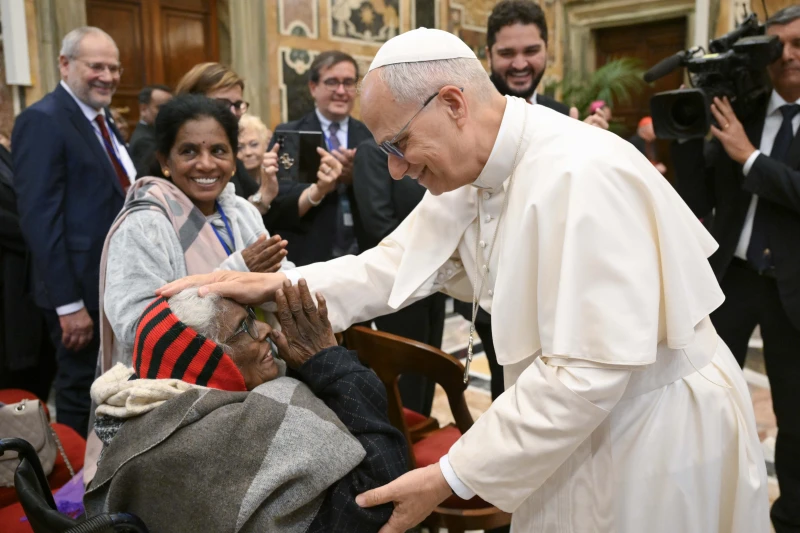

ACI Prensa Staff, Oct 3, 2025 / 15:08 pm (CNA).
Pope Leo XIV on Friday said that old age is both a gift and a challenge, and in response the Catholic Church is called to develop missionary pastoral care that involves the elderly as witnesses of hope.
On Oct. 3, the pontiff received at the Vatican Apostolic Palace participants in the Second International Congress on Pastoral Care of the Elderly, organized by the Dicastery for the Laity, the Family, and Life.
In his address, Leo XIV emphasized that the theme of the meeting, “Your Elders Shall Dream Dreams,” taken from the book of the prophet Joel, contains words dear to his predecessor, Pope Francis, who often spoke “of the need for an alliance between young and old.”
The pontiff explained that in this biblical passage, “the prophet announces the universal outpouring of the Holy Spirit, who creates unity among generations and distributes different gifts to each person.” He also lamented that today, “relationships between generations are often marked by divisions and conflicts that pit them against each other.”
Specifically, he referred to two criticisms: that the elderly “do not leave room for young people in the workforce” or that they are “consuming too many economic and social resources to the detriment of other generations, as if longevity were a fault.”
In this regard, Leo XIV expressed his conviction that “the elderly are a gift, a blessing to be welcomed,” and that longevity “is one of the signs of hope in our time, everywhere in the world.”
At the same time, the pontiff emphasized that this is “a challenge, because the growing number of elderly people is an unprecedented historical phenomenon that calls us to discern and understand the reality in new ways.”
In this sense, in the face of the current mentality that “tends to value existence if it produces wealth or success, if it exercises power or authority, forgetting that the human being is always a limited creature with needs,” Pope Leo XIV emphasized that the fragility that appears in the elderly is “hidden or removed by those who cultivate worldly illusions, so as not to have before their eyes the image of what we will inevitably become.”
However, he added, “it is healthy to realize that aging is part of the marvel of creation,” as he expressed during the Jubilee of Youth last August.
The pope invited people to stop being ashamed of human weakness so that “we will in fact be led to ask for help from our brothers and sisters and from God, who watches over all his creatures as a Father.”
“The Church is called to offer times and tools for understanding old age, so that we can live it in a Christian way, without pretending to remain forever young and without letting ourselves be overcome by discouragement,” continued the pope, who recommended the catechesis Pope Francis dedicated to this topic as “very valuable.”
Pope Leo XIV valued the presence of older people who, once their working life is over, “have the opportunity to enjoy an increasingly long period of good health, economic well-being and more free time” and who are often “the ones who attend Mass assiduously and lead parish activities, such as catechesis and various forms of pastoral service.”
“It is important to find an appropriate language and opportunities for them, involving them not as passive recipients of evangelization but as active subjects, and to respond together with them, and not in their place, to the questions that life and the Gospel pose to us,” he added.
Coming from different life experiences and relationships with the faith, the pontiff noted: “For all of them, the pastoral care of the elderly must be evangelizing and missionary, because the Church is always called to proclaim Jesus Christ the Savior to every man and woman, at every age and stage of life.”
This involves, first and foremost, bringing “them the good news of the Lord’s tenderness, to overcome, together with them, the darkness of loneliness, the great enemy of the lives of the elderly” in a missionary task that “challenges all of us, our parishes, and, in a particular way, young people, who can become witnesses of closeness and mutual listening to those who are further along in their lives.”
“In other cases, missionary evangelization will help older people to encounter the Lord and his word. With advancing age, in fact, many people begin to question the meaning of existence, creating an opportunity to seek an authentic relationship with God and to deepen their vocation to holiness,” the pontiff noted.
Finally, Leo XIV recalled that “proclaiming the Gospel is the primary task of our pastoral ministry: By involving older people in this missionary dynamic, they too will be witnesses of hope, especially through their wisdom, devotion, and experience.”
This story was first published by ACI Prensa, CNA’s Spanish-language news partner. It has been translated and adapted by CNA.
Read More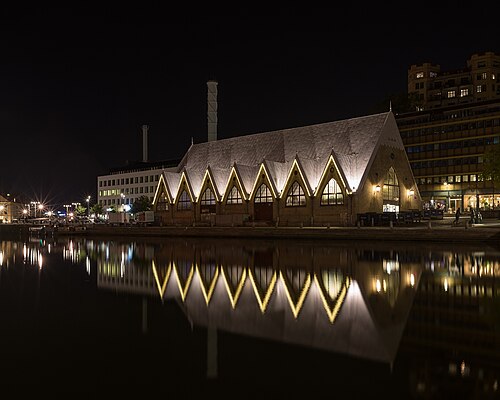
Remember, O most chaste Spouse of the Virgin Mary, that never was it known that anyone who implored your help and sought your intercession was left unassisted. Full of confidence in your power, I fly unto you, and beg your protection. Despise not, O foster-father of the Redeemer, my humble supplication, but in your bounty, hear and answer me. Amen.
Read More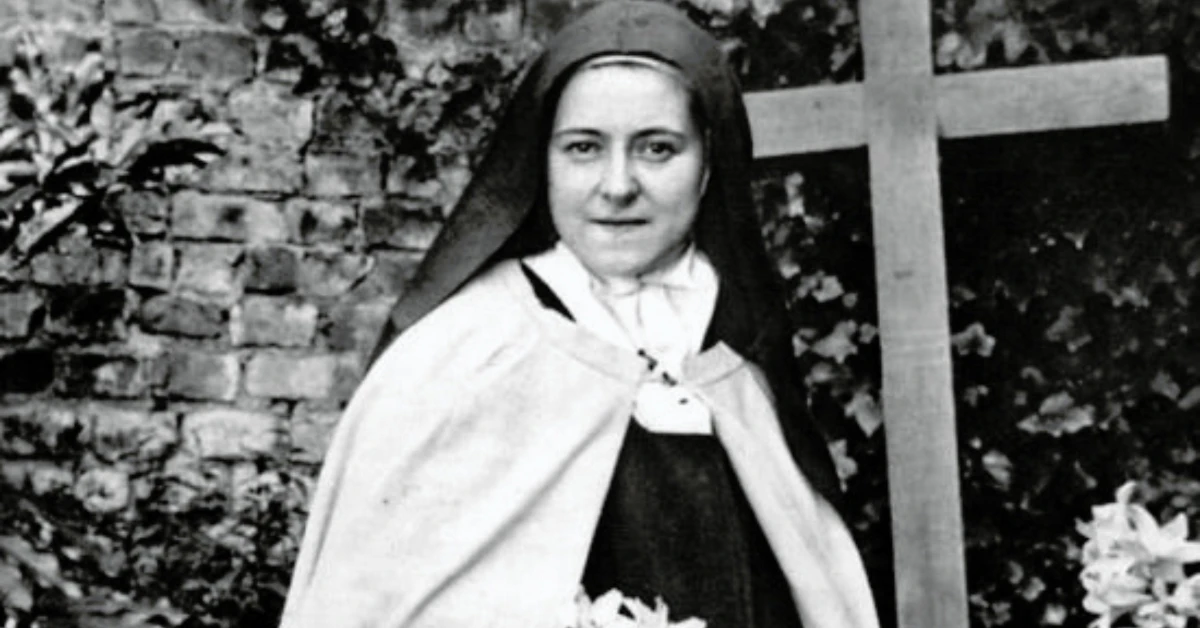

Ann Arbor, Michigan, Oct 2, 2025 / 17:02 pm (CNA).
The faithful are gathering in Michigan, where the relics of St. Thérèse of Lisieux are on display at the National Shrine of the Little Flower Basilica in Royal Oak, near Detroit. A Mass of installation was celebrated on Oct. 1 by Archbishop Edward Weisenburger and rector Father John Bettin as the beautiful, glass-encased reliquary was present near the altar.
In an interview with CNA, Bettin said the saint’s bones and reliquary first visited the United States and the basilica named for her over a quarter of a century ago, in 1999. The 2025 tour is the first stop of 40 in 11 states. According to the StThereseusa2025.com website, her relics will go to California; Washington, D.C.; Texas; Wisconsin; and various Carmelite convents through December.

Bettin pointed out that the “simplicity and depth” of the saint’s spirituality has a growing appeal that transcends national boundaries. “She is a doctor of the Church and one of the most beloved saints of all time. The last time she was here, approximately 70,000 pilgrims visited the shrine in one day. We are planning for even bigger crowds,” he said.
Over 400 volunteers are supporting the shrine’s staff to accommodate the many pilgrims who will visit from Oct. 1–8. During a recent visit, volunteers could be seen signing up duty rosters while others were busy festooning the beautiful sanctuary with roses.
Born in Alençon, France, on Jan. 2, 1873, Thérèse Martin was the daughter of Louis Martin and Zélie Guérin. When Zélie died, young Thérèse and her family moved to Lisieux in northern France. When her sisters entered the Carmel of Lisieux, she wished to follow them but was turned down because of her youth. But during an audience with Pope Leo XIII, she was granted permission. She entered the Carmel in 1888 and made her religious profession in 1890.
During her nine years in the Carmel, she was ultimately wracked with doubt. Even so, she wrote fervently about her love of God, much like the Carmelite saints Teresa de Avila and John of the Cross. Following her death from tuberculosis at the age of 24 in 1897, her Carmelite sisters gathered her writings, which have since formed the basis of “The Story of a Soul,” a book that has been translated into numerous languages and millions of copies.

Bettin spoke warmly of the special devotion that Chaldean Catholics, for example, have for the saint, and said he expects many to visit the relics. Father Patrick Setto, a priest of Iraqi origin of the Chaldean Catholic Church in the Detroit area, told CNA that he and his community are grateful for being able to celebrate their liturgy at the basilica. He noted that he recently held a silent retreat for adults, centering on the life of St. Thérèse and her Little Way.
In an interview, Setto said his relationship with St. Thérèse goes back to his childhood. When he was in the sixth grade in 1999, he and his mother waited for hours to venerate the relics. He recalled that when the reliquary came around in a procession, he wanted to reach out and touch it.
“But I was so short, I couldn’t get to it. So, a man — out of nowhere — lifted me out of the pew and I got to touch it,” Setto said. “Soon, 26 years later, I will celebrate a Mass in the shrine with her reliquary there.”
“It’s a very powerful, special blessing that God has bestowed on me,” he added. He never saw the man again, he said.
The priest said that Dominican and Redemptorist missionaries to Iraq spread devotion to St. Thérèse in the early 20th century. The Catholics in Iraq feel a connection to her amid their suffering during war and Muslim domination, and during their flight as refugees. In a 2014 video message, Pope Francis referred to Iraqi refugees as “the reeds of God,” in parallel to the saint’s spirituality of perseverance and faith despite adversity.
Bettin also has a special relationship with St. Thérèse. As the youngest of 11 children in his family, he was often chided as “spoiled,” much like the saint, who was also the youngest in her family. In her memoir, St. Thérèse recalled that when she was 14, she was tearful upon overhearing her father say that it would be the last Christmas she would receive gifts typical for children.
“St. Thérèse’s spirituality began as a little girl when she was not sure that there was a world outside of herself. But she had an epiphany, if you will, on Christmas in 1886 when she experienced a profound conversion,” Bettin said. “She realized there was a world outside, and she gained a great devotion for God. It was not so much for herself, but for others.”
Both priests called on Catholics to come to the shrine to venerate the relics. When Bettin was asked what Christians can expect from venerating the relics, he said: “It’s interior for each pilgrim who comes, whether they are parishioners, from Detroit, or other countries.”
Some may even see miracles, said Setto, who cited the Old Testament, where in 2 Kings 13:21, a dead man was brought back to life after his body touched the bones of the prophet Elisha. “Come and see her,” he said.
Dominican Sister Mercedes Torres, who serves as vocations director of the Dominican Sisters of Mary, Mother of the Eucharist in nearby Ann Arbor, invited the world, especially young people, to visit with the saint while her relics are in the U.S.
In a video, Sister Mercedes said: “Faith is essential to who we are. But it’s really that call of love that we have all been called to live. St. Thérèse is making herself known to young people in the country right now. Go and see her as she is making herself known, and you can make yourself known to her. Make your intentions known to St. Thérèse. It is such a gift, and I want everyone to participate in that gift.”
Setto said that those who are discouraged in their search for closeness to God can go to the writings of the saint and experience renewal. When people experience shame and discouragement, he said St. Thérèse can help them “refocus on God’s mercy rather than their weakness, just as St. Paul says that in my weakness, God is able to be strong in me. She was able to flesh that out in a very human and practical way that is easy to understand.”
Read More

CNA Staff, Oct 2, 2025 / 16:13 pm (CNA).
The U.S. Food and Drug Administration (FDA) this week approved a new abortion pill made by a company that explicitly says it seeks to “normalize” abortion.
A Sept. 30 letter obtained from the office of Sen. Josh Hawley, R-Missouri, said the FDA approved the abbreviated new drug application for “mifepristone tablets” from Evita Solutions, a Virginia-based pharmaceutical company.
The FDA said in the letter that it had “concluded that adequate information has been presented to demonstrate that the drug meets the requirements for approval” under the Federal Food, Drug, and Cosmetic Act.
On its website as of Oct. 2, Evita Solutions was advertising a “new generic mifepristone product” coming to the U.S. Mifepristone constitutes one of the major components of abortion pill prescriptions.
The company says it “assist[s] the medical community in recognizing the utility and freedom that medical abortion provides patients.”
“[W]e seek to normalize abortion care, and we commit to making care accessible to all,” it says.
Evita Solutions did not immediately respond to a request for comment on Oct. 2. The drug’s approval, meanwhile, was met with criticism and pushback from pro-life advocates.
In an X post, Hawley called the approval “shocking.”
He wrote that the approval came “when the evidence shows chemical abortion drugs are dangerous and even deadly for the mother. And of course 100% lethal to the child.”
Marjorie Dannenfelser, the president of Susan B. Anthony Pro-Life America, said in a media statement that the “reckless” approval by the FDA was “unconscionable.”
“These dangerous drugs take the lives of unborn children, place women and underage girls at serious risk, empower abusers, and trample the pro-life laws enacted by states across the nation,” she said.
Kristan Hawkins, the president of Students for Life of America, said in a statement that the Trump administration’s approval of the drug “represents a true failure.”
“More babies will die; more women will be harmed; and more Americans [will be] exposed to abortion water pollution as a direct result of this unfathomable decision,” she said. “This is a stain on the Trump presidency and another sign that the deep state at the FDA must go.”
Read More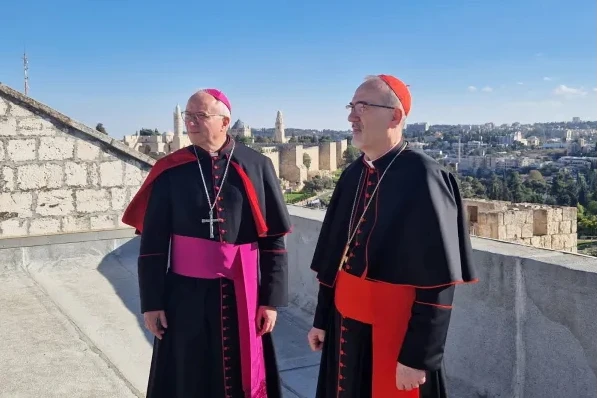

Rome Newsroom, Oct 2, 2025 / 14:46 pm (CNA).
The secretary-general of the Italian Bishops’ Conference (CEI, by its Italian acronym), Archbishop Giuseppe Baturi, has concluded a significant visit to the Holy Land, the CEI announced. The visit took place Sept. 27–30.
Cardinal Pierbattista Pizzaballa, the Latin patriarch of Jerusalem, in the CEI statement said: “In this difficult moment of solitude and abandonment, closeness and presence are important: for this we wish to express our sincere gratitude. We know that these visits are not to be taken for granted, and we know, as we have said in recent days, that all this is true and heartfelt. We have perceived it in recent months from many Italian churches — a real closeness.”
During the visit, Baturi had the opportunity to meet “some priests gathered on retreat: They told us they felt the need and were grateful for this empathy and closeness they have needed, more so than any projects,” Pizzaballa said.
In addition, during the same visit, Baturi announced a major joint project between the CEI and the Latin Patriarchate of Jerusalem: the opening of a hospital in Gaza. The archbishop noted that “there is a very serious health problem, and we want to address it together with the patriarchate: It is a concrete commitment, which will take a great deal of effort,” Baturi explained.
The visit was also an opportunity to explore the possibility of a pilgrimage by representatives of the Italian episcopate, as has already happened with several regional bishops’ conferences, the statement added.
In this regard, Baturi said: “We want to relaunch pilgrimages as a practice capable of forging bonds with communities, not just visiting places. This appeal has come to us from many parish priests, both in Judea and Galilee. We will therefore make a pilgrimage as Italian bishops and promote many others: It is a concrete form of closeness and solidarity.”
This story was first published by ACI Stampa, CNA’s Italian-language news partner. It has been translated and adapted by CNA.
Read More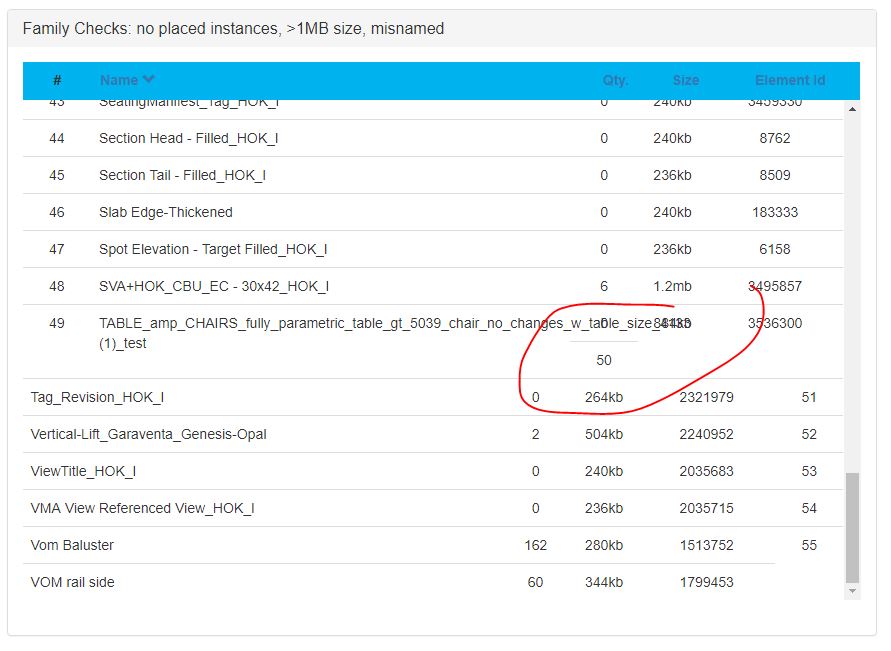
| Picture of the day |
|---|
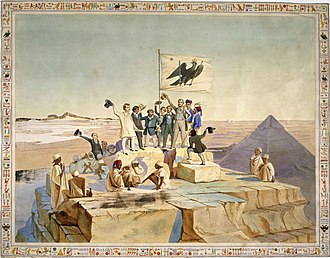
|
|
The participants of the Prussian Egypt expedition on the top of the Great Pyramid, watercolour by Johann Jakob Frey, 1842
|
Almighty God, our Father,
you who have given us life
and intended us to have it forever,
grant us your blessings.
Enlighten our minds to an awareness
and to a renewed conviction
that all human life is sacred
because it is created
in your image and likeness.
Help us to teach by word
and the example of our lives
that life occupies the first place,
that human life is precious
because it is the gift of God
whose love is infinite.
Give us the strength to …
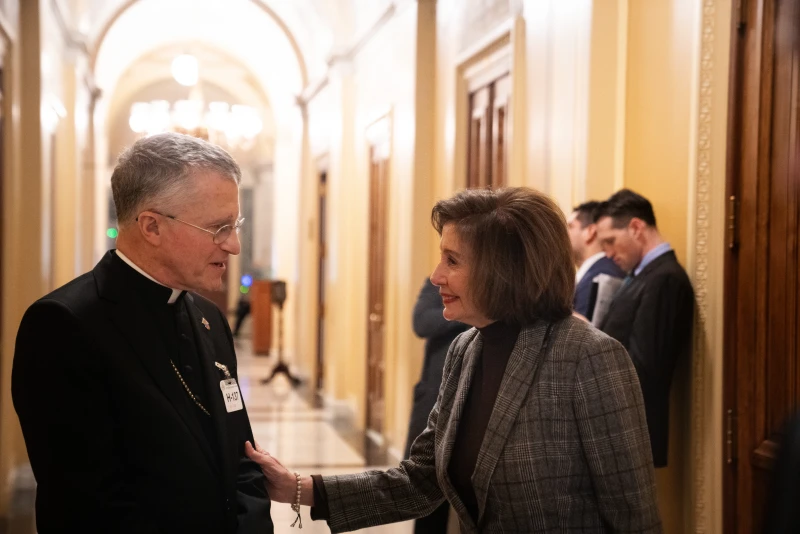

Washington, D.C. Newsroom, Oct 1, 2025 / 16:35 pm (CNA).
On the occasion of the fifth anniversary of the papal encyclical Fratelli Tutti, Archbishop Timothy Broglio, president of the U.S. Conference of Catholic Bishops (USCCB), issued a clear exhortation to the faithful, saying: “I beg you to see Christ in every person, even those whose politics you oppose.”
Pope Francis’ 2020 encyclical letter on fraternity and social friendship was inspired by St. Francis of Assisi’s call for “love that transcends the barriers of geography and distance.” On the anniversary of the letter, as terrifying acts of violence continue to occur in the U.S., Broglio encouraged Americans to reflect on the value of every human life.
Broglio’s pastoral invitation comes in the wake of “shocking acts of political violence” across the nation, stemming from “hostility and division,” Broglio wrote in a USCCB statement. “Places once regarded as safe harbors to grow and learn — our schools, universities, and churches — have become sites of heartbreaking tragedy and bloodshed.”
“Pope Francis outlined steps our world must take to rebuild a sense of communion in the wake of what he described as ‘shattered dreams,’” Broglio said. “As the encyclical prophetically points out, people are being manipulated ‘to serve as tools for domination, as meaningless tags that can be used to justify any action.’”
“We have seen the manifestation of this notion in the perverse idea that one can serve the common good by becoming an instrument of violence,” Broglio said. “This happens when we refuse to see the face of Christ in the other person and only see an enemy that must be dominated or destroyed.”
Pope Franics wrote: “The path to social unity always entails acknowledging the possibility that others have, at least in part, a legitimate point of view, something worthwhile to contribute, even if they were in error or acted badly.”
Therefore, building peace in our nation “requires us to place at the center of all political, social, and economic activity the human person from conception to natural death, who enjoys the highest dignity, and respect for the common good.”
To follow Pope Francis’ call, Broglio calls on each of us to “examine our hearts, our thoughts, and our actions and ask ourselves how we contribute to the polarization and animosity plaguing our nation.”
To “begin to heal the rifts between us,” Broglio called on people to perform corporal works of mercy including feeding the hungry, sheltering the homeless, and visiting the sick and imprisoned. He also encouraged people to fast from social media and take time to pray for their enemies.
In his encyclical, Pope Francis said “authentic reconciliation does not flee from conflict but is achieved in conflict, resolving it through dialogue and open, honest, and patient negotiation.”
Broglio said: “Listen and talk with those you with whom you disagree — especially within your own family. Disagree, debate civilly, stand for your rights, but always remember in your heart that we are all children of God and deserve dignity and life.”
“On this fifth anniversary of Pope Francis’ encyclical letter Fratelli Tutti, let us pray ‘so that we may discover anew that all are important and all are necessary, different faces of the one humanity that God so loves. Amen.’”
Read More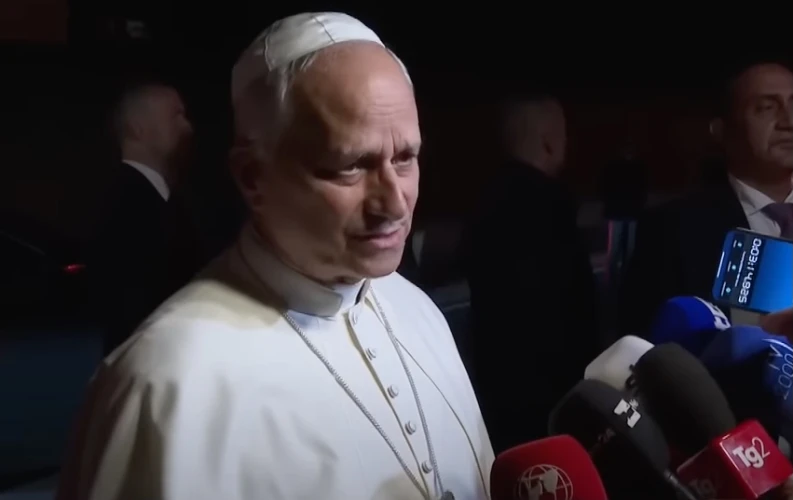

ACI Prensa Staff, Oct 1, 2025 / 16:05 pm (CNA).
Late Tuesday, Pope Leo XIV answered several questions from journalists at Villa Barberini, the papal residence in Castel Gandolfo, where he addressed various issues.
Asked about the plan proposed by U.S. President Donald Trump to resolve the crisis in Gaza, the pontiff stated: “We hope they accept it. So far, it seems to be a realistic proposal.”
“It’s important, nonetheless, that there be a ceasefire and the release of the hostages. But there are elements there that I think are very interesting, and I hope Hamas will accept it within the established time frame,” he added.
Trump and Israeli Prime Minister Benjamin Netanyahu announced Sept. 29 that they have agreed on a plan to end the war, although it is unknown whether Hamas will accept the terms. The 20-point plan seeks to halt the war between Israel and Hamas through a temporary governing body in Gaza, headed by Trump and also including former British Prime Minister Tony Blair.
The plan does not require population displacement and calls for an immediate end to hostilities if both sides agree. It also demands that the remaining hostages be released within 72 hours of Israel’s acceptance of the agreement. Trump assured that Israel would have the “full support” of the United States to defeat Hamas if the armed group rejects the proposal.
The Holy Father also referred to the arrival on the coast of Gaza of vessels from the Global Sumud Flotilla, sent with humanitarian aid and with the purpose of breaking the naval blockade imposed by Israel, despite warnings from the Israeli government, which has demanded the suspension of the mission.
“It’s very difficult. There’s a desire to respond to a true humanitarian emergency, but there are many elements [involved] there, and all sides are saying that we hope there will be no violence and that people will be respected. That’s very important,” he noted.
This story was first published by ACI Prensa, CNA’s Spanish-language news partner. It has been translated and adapted by CNA.
Read More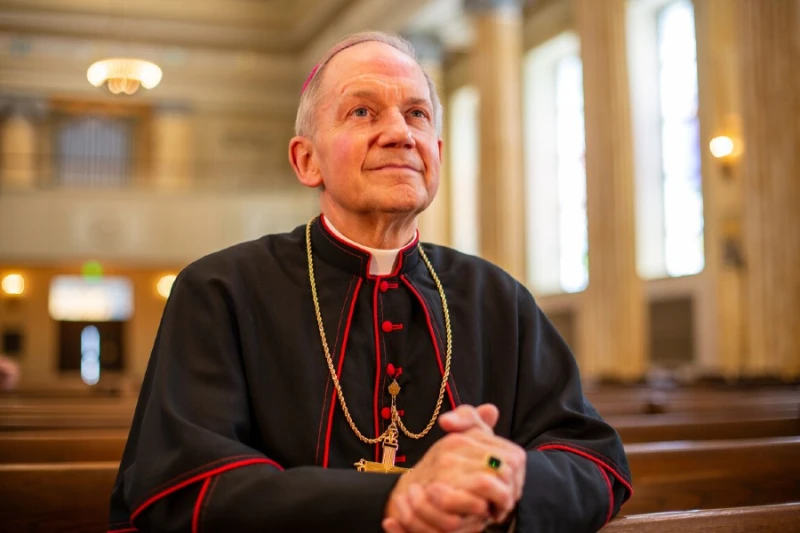
.jpg?w=800&jpg)
CNA Staff, Oct 1, 2025 / 15:35 pm (CNA).
Various U.S. bishops expressed relief and happiness after U.S. Sen. Dick Durbin, D-Illinois, announced his decision to decline an award from the Chicago Archdiocese following backlash over his pro-abortion views.
Late Tuesday, Chicago Archbishop Cardinal Blase Cupich said Durbin had decided to back away from receiving the award after numerous U.S. bishops criticized the archdiocese for selecting Durbin to receive the honor.
The Illinois senator was scheduled to receive a “Lifetime Achievement Award for support to immigrants” at an archdiocesan event in November. Cupich described the senator as embodying “unwavering support of immigrants, which is so needed in our day.”
Springfield, Illinois, Bishop Thomas Paprocki, who presides over Durbin’s home diocese, had in September said Durbin was “unfit to receive any Catholic honor.” In an Oct. 1 statement on X, the bishop said he was “grateful” that the senator ultimately declined the award.
Noting that October is Respect Life Month, Paprocki urged Catholics to “continue to pray for our Church, our country, and for the human dignity of all people to be respected in all stages of life including the unborn and immigrants.”
Arlington, Virginia, Bishop Michael Burbidge, meanwhile — who previously served as chairman of the U.S. Conference of Catholic Bishops’ pro-life committee — said on Oct. 1 that he was “relieved” at Durbin’s decision.
“The Church must continue to boldly proclaim the gospel of life in its entirety,” he said. “Our public witness to the Gospel, to convincingly move hearts and minds to conversion, will always require that the Church show the hierarchy and unity of all truths.”
In his Sept. 30 statement announcing Durbin’s withdrawal from the award, Cupich said he was proposing “synodal gatherings” for Catholics “to experience listening to each other with respect on these issues.”
Burbidge in turn noted that productive conversations “occur only when participants share a basic commitment to certain objective moral realities about what is good and evil.”
Among those, he said, is “the human right to life.”
“True dialogue cannot take place when a purportedly Catholic lawmaker turns a blind eye to the killing of innocent persons,” he said.
Durbin’s withdrawal from the award came just hours after Pope Leo XIV addressed the controversy, with the Holy Father — himself a Chicago native — arguing that such political disputes are “complex.”
“I understand the difficulty and the tensions. But I think as I myself have spoken in the past, it’s important to look at many issues that are related to the teachings of the Church,” the pope said.
Numerous other U.S. bishops had previously expressed disapproval over the proposed award, including Bishop James Conley of Lincoln, Nebraska; Bishop James Wall of Gallup, New Mexico; and San Francisco Archbishop Salvatore Cordileone.
In a statement on X on Oct. 1, Cordileone extended Durbin “complements” for withdrawing from the award, which the prelate described as a “great display of magnanimity.”
“In such a contentious issue that threatens even greater division, Sen. Durbin chose to take the higher moral ground,” the prelate said. “Such an act required tremendous humility on his part. We need more humility in our country.”
Read More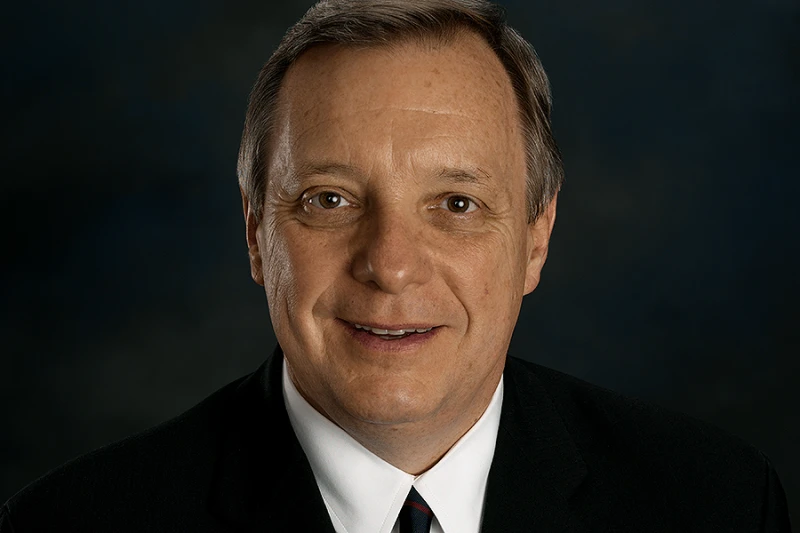

CNA Staff, Sep 30, 2025 / 20:02 pm (CNA).
U.S. Sen. Dick Durbin, D-Illinois, will decline an award from the Archdiocese of Chicago after global backlash over his strong pro-abortion views that included comments from Pope Leo XIV and criticism from U.S. bishops.
Chicago archbishop Cardinal Blase Cupich announced Durbin’s decision in a Sept. 30 statement, revealing that Durbin informed the prelate that he “decided not to receive [the] award” at the archdiocesan Keep Hope Alive celebration on Nov. 5. Durbin was scheduled to receive a “Lifetime Achievement Award for support to immigrants” at the event.
Cupich’s announcement brings an end to a chaotic late September in which his brother bishops in the U.S. criticized the decision to grant Durbin the award, citing the Democratic senator’s long track record of pro-abortion politics.
The controversy even reached the Vatican itself, where on Sept. 30 Pope Leo XIV — responding to a question from EWTN News — said it was “important to look at the overall work that a senator has done [during] 40 years of service in the United States Senate.”
“I understand the difficulty and the tensions,” the Holy Father said. “But I think as I myself have spoken in the past, it’s important to look at many issues that are related to the teachings of the Church.”
Multiple U.S. bishops and archbishops criticized the decision. Springfield, Illinois, Bishop Thomas Paprocki, who presides over Durbin’s home diocese, described the senator as “unfit to receive any Catholic honor.”
In his lengthy statement on Tuesday, Cupich said the decision to grant Durbin the award “was specifically in recognition of his singular contribution to immigration reform and his unwavering support of immigrants, which is so needed in our day.”
The prelate said divisions within the Catholic Church have “dangerously deepen[ed]” over the course of the half-century that he has served as a priest and the more-than-quarter-century he has served as a bishop.
“The tragedy of our current situation in the United States is that Catholics find themselves politically homeless,” he said. “The policies of neither political party perfectly encapsulate the breadth of Catholic teaching.”
The archbishop argued against “total condemnation” of Catholic politicians who fail to adhere to the “essential elements” of Catholic social teaching. Such broad criticism, he said, “shuts down discussion.”
“But praise and encouragement can open it up, by asking their recipients to consider how to extend their good work to other areas and issues,” he said. “More broadly, a positive approach can keep alive the hope that it is worth talking to one another — and collaborating with one another — to promote the common good.”
Cupich said he had hoped that the Keep Hope Alive celebration would raise awareness of the similarity between the Church’s defense of migrants and its defense of “the vulnerable on the border between life and death.” He argued, meanwhile, that the Chicago Archdiocese was not “softening” its position on abortion.
“The Catholic bishops heroically responded when the right to life of the unborn was negated by the 1973 decisions of the Supreme Court,” he said. “That right to life still needs to be defended without compromise.” The U.S. bishops have likewise “long invested our energy and resources” in defending immigrants, he said.
The archbishop in his statement proposed “synodal gatherings” for Catholics “to experience listening to each other with respect on these issues, all the while remaining open to maturing more fully in their common identity as Catholics.” Cupich said he would be seeking input on those gatherings.
“We can move forward if we Keep Hope Alive,” he said.
Read MoreGovern by all Thy Wisdom, O Lord,
so that my soul may always be serving Thee as Thou dost Will,
and not as I may choose.
Do not punish me, I beseech Thee,
by granting that which I wish
or ask if it offended Thy Love,
which would always live in me.
Let me die to myself,
so that I may love Thee.
Let me live to Thee,
Who art in Thyself,
the True Life.
Dear St. Therese,
guide me in your Little Way,
so that I may ascend to the heights and happiness of Heaven.
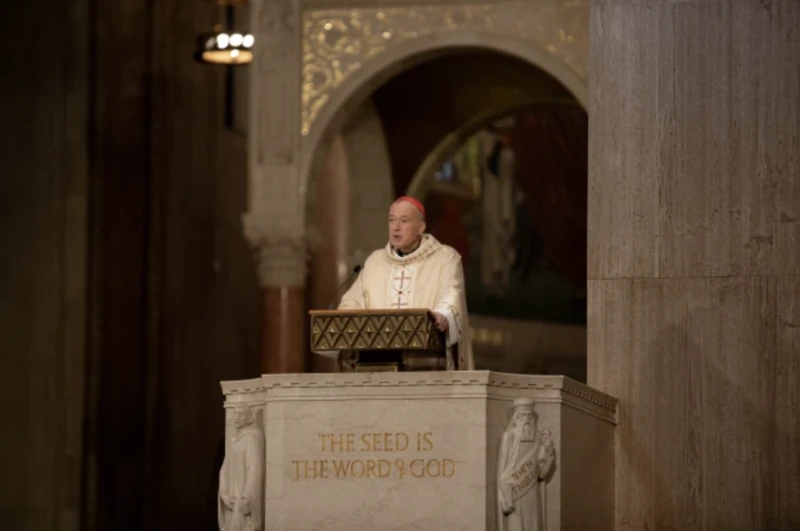

Washington, D.C. Newsroom, Sep 30, 2025 / 18:42 pm (CNA).
Cardinal Robert McElroy delivered a homily on Sunday urging Catholics to “embrace in a sustained, unwavering, prophetic, and compassionate way” migrants to the U.S. at a Mass for the 11th World Day of Migrants and Refugees.
“For the past 110 years, Mass has been celebrated throughout our country to honor and support immigrants and refugees who have come to our nation as part of that stream of men and women from every land who have built up the United States into a great nation,” McElroy said in his homily at the Cathedral of St. Matthew the Apostle in Northwest D.C. on Sept. 28.
“But this year is different from the 110 years that have preceded it,” he said, “for this year we are confronting — both as a nation and as a Church — an unprecedented assault upon millions of immigrant men and women and families in our midst.”
McElroy described the Trump administration’s approach to immigration as “a comprehensive campaign to uproot millions of families” that “relies on fear and terror at its core.” The Trump administration’s goal, he said, “is simple and unitary: to rob undocumented immigrants of any real peace in their lives so that in misery they will ‘self-deport.’”
Addressing the administration’s assertion that all migrants who enter the country illegally should be removed, McElroy argued that the Gospel “proposes a far different measure” that migrants are “our neighbors.”
Referencing the parable of the good Samaritan, McElroy argued that “the most striking element” of the story was “that the Samaritan was willing to reject the norms of society which said that because of his birth and status he had no obligation to the victim, who was a Jew.”
“The piercing insight and glory of the Samaritan was that he rejected the narrowness and myopia of the law to understand that the victim he was passing by was truly his neighbor and that both God and the moral law obligated him to treat him as neighbor,” he stated.
McElroy referenced the Catholic community in Washington, D.C., who he said has witnessed many migrants of faith who “have been swept up and deported in the crackdown which has been unleashed in our nation.”
“We are witnessing a comprehensive governmental assault designed to produce fear and terror among millions of men and women who have through their presence in our nation been nurturing precisely the religious, cultural, communitarian, and familial bonds that are most frayed and most valuable at this moment in our country’s history,” McElroy said.
McElroy noted that Catholic social teaching categorizes border security and the deportation of criminals convicted of “serious crimes” as legitimate national goals.
However, he said, “at times, our government asserts that these goals constitute the essence and scope of its immigration enforcement efforts, and if that were true Catholic teaching would raise no objection.”
Ultimately, the cardinal called on Catholics to “form our stance and action as people of faith,” to “stand in solidarity with the undocumented men and women whose lives are being upended by the government’s campaign of fear and terror.”
Read More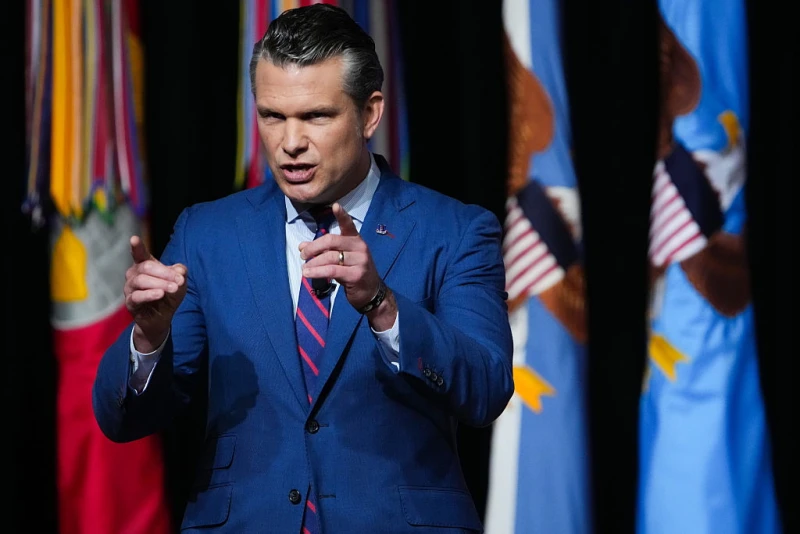

Washington, D.C. Newsroom, Sep 30, 2025 / 18:22 pm (CNA).
Pope Leo XIV on Tuesday said the U.S. Department of Defense secretary’s way of speaking about war is “worrying.”
Addressing an audience of military brass summoned to Virginia, Defense Secretary Pete Hegseth on Sept. 30 urged senior officers to lead with an eye on more “lethality.” President Donald Trump this month signed an executive order changing the department’s name to Department of War, although it has not been officially changed by Congress.
Asked about the secretary’s meeting with the generals and comments about readiness for war, Pope Leo said: “This way of speaking is worrying, because it shows each time an increase in tensions — this vocabulary, even shifting from ‘Minister of Defense’ to ‘Minister of War.’ Let’s hope it is only a way of speaking. Certainly, they have a style of government where they want to show strength, to put pressure, and we hope it works, but that there will not be war. One must always work for peace.”
The Chicago-born Pope Leo spoke to reporters as he was leaving the papal villa of Castel Gandolfo near Rome, where in recent weeks he has made it a practice to spend Tuesdays before returning to the Vatican.
The pope’s comments were translated from Italian.
The Defense Department did not immediately reply to a request for comment.
Read More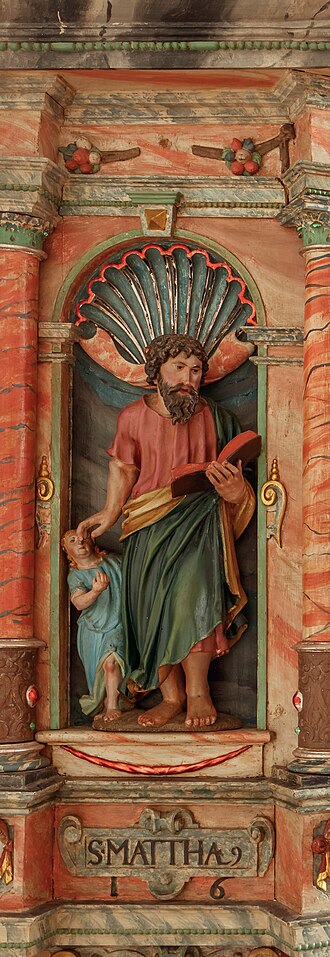
(This is an old Guardian Angel Prayer)
O Holy Angel,
attendant of my wretched soul
and of mine afflicted life,
forsake me not, a sinner,
neither depart from me for mine inconstancy.
Give no place to the evil demon to subdue me
with the oppression of this mortal body;
but take me by my wretched and outstretched hand,
and lead me in the way of salvation.
Yea, O holy Angel of God,
the guardian and protector
of my hapless soul and body,
forgive me all things …


ACI Africa, Sep 29, 2025 / 15:24 pm (CNA).
Members of the Zimbabwe Heads of Christian Denominations (ZHOCD) marked the International Day of Peace on Sept. 21 with an appeal to the international community to cancel Zimbabwe’s debt, saying such a step would help revive the country’s economy, reduce poverty, and build lasting peace.
Zimbabwe is struggling with an $8.3 billion debt (in U.S. dollars), mostly in arrears, which blocks access to affordable international financing and slows economic recovery.
In a joint statement published on Twitter by the Zimbabwe Council of Churches, the ZHOCD body, which consists of the Zimbabwe Catholic Bishops’ Conference, Evangelical Fellowship of Zimbabwe, and the Union for Development of Apostolic Churches in Zimbabwe Africa, the Christian leaders stressed that peace cannot be separated from social and economic well-being.
“On this International Peace Day, we urge international partners to consider debt cancellation to alleviate the economic burden on our nation and local leadership to alleviate the situation and arrest the social evils that threaten the very fiber of our society,” members of ZHOCD said in their collective Sept. 21 statement.
“Such a step could enable Zimbabwe to redirect critical resources towards vital sectors like health care, education, and infrastructure development, addressing poverty and inequality,” they added.
The Christian leaders reflected on the state of peace in the Southern African nation, saying that despite the country’s good security, the people of God are still experiencing injustices and inequalities.
They noted that while Zimbabwe is not embroiled in outright violence or war, the situation of the country can be characterized as a “negative peace,” a concept they said highlights the “absence of direct violence but presence of underlying structural injustices and inequalities.” They said the country is grappling with economic hardships, political polarity, and social injustices.
They specifically pointed out social ills like drug and substance abuse, widespread domestic violence, and armed robberies that they described as “a worrisome phenomenon” all impact the well-being of the people, particularly vulnerable groups like women, youths, and persons with disabilities.
The members of ZHOCD called upon all political leaders in Zimbabwe to prioritize peace, justice, and the human rights of Zimbabweans, especially the vulnerable.
“Let us work together to promote dialogue and understanding, address root causes of conflict, and protect human dignity and rights,” they said in their message.
The Christian leaders in Zimbabwe referred to the words of Mahatma Gandhi on poverty and stated their support for structural issues to be addressed to restore positive peace “marked by justice, equity, and human dignity for all Zimbabweans.”
“Let us work together to build a more peaceful, just, and stable society in Zimbabwe and contribute to global peace efforts,” they said.
This story was first published by ACI Africa, CNA’s news partner in Africa, and has been adapted by CNA.
Read More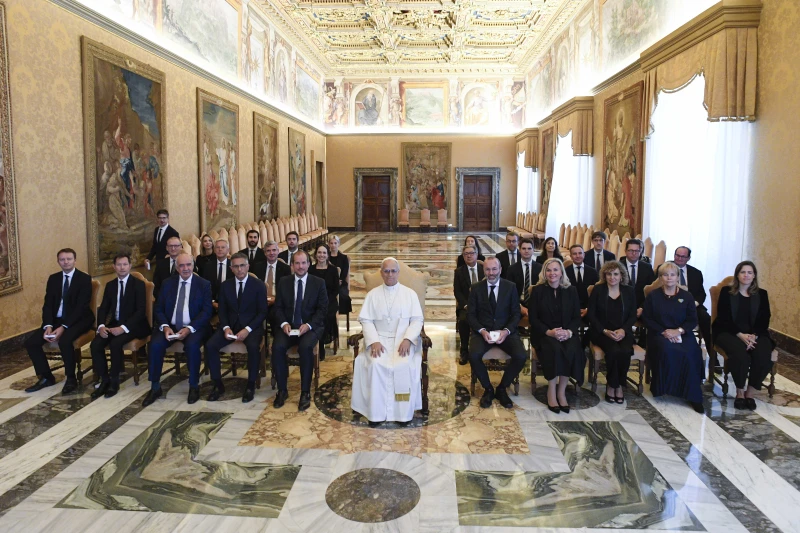

Vatican City, Sep 29, 2025 / 14:52 pm (CNA).
Pope Leo XIV on Monday said European institutions need “people who know how to live a healthy secularism” while urging recognition that religion has value both on a personal and social level.
“When the religious dimension is authentic and well cultivated, it can greatly enrich interpersonal relationships and help people live in community and society. And how important it is today to emphasize the value and importance of human relationships!” he noted.
Leo XIV made his remarks on Sept. 29 when receiving at the Vatican the European Parliament’s Working Group on Intercultural and Interreligious Dialogue. The objective of this structure, an initiative of the European People’s Party (EPP) coaltion, is to promote dialogue between different cultures, religions, philosophical beliefs, and nondenominational communities within Europe.
The pope also emphasized that participation in interreligious dialogue, by its very nature, “recognizes that religion has value both on a personal level and in the social sphere.”
“Being men and women of dialogue means remaining deeply rooted in the Gospel and the values derived from it and, at the same time, cultivating openness, listening, and dialogue with those from other contexts, always placing the human person, human dignity, and our relational and communal nature at the center,” the pope explained in his address.
The Holy Father emphasized that promoting dialogue between cultures and religions is a “fundamental objective for a Christian politician” and cited as examples Robert Schuman, Konrad Adenauer, and Alcide De Gasperi, considered the founding fathers of what eventually became the European Union, who also lived their faith as a sociopolitical commitment.
Thus, he urged the cultivation of a style of thought and action that affirms the value of religion, while “preserving its distinction — not separation or confusion — with respect to the political sphere.”
This story was first published by ACI Prensa, CNA’s Spanish-language news partner. It has been translated and adapted by CNA.
Read More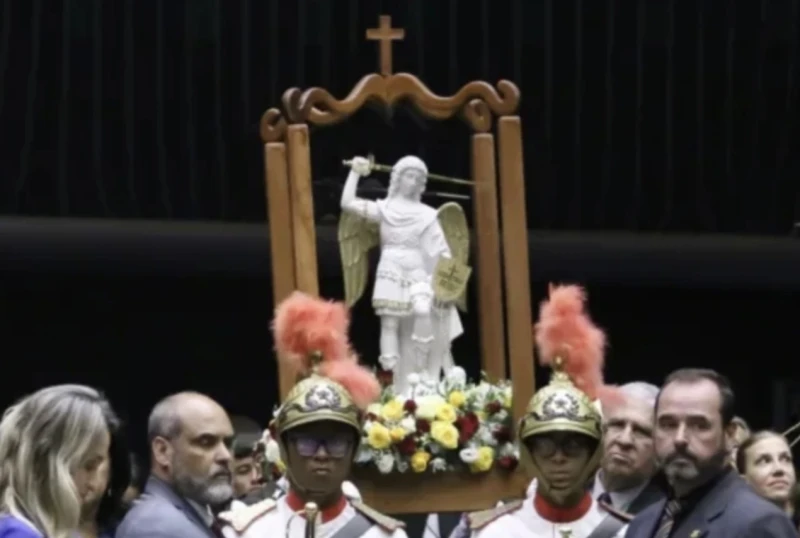

Sao Paulo, Brazil, Sep 29, 2025 / 14:17 pm (CNA).
St. Michael the Archangel’s feast day was officially incorporated into Brazil’s national calendar following the enactment of a law approved by acting President Geraldo Alckmin and published on Sept. 25 in the official government gazette.
The date established is Sept. 29, the day on which the Catholic Church celebrates the holy archangels Michael, Gabriel, and Raphael, and in particular St. Michael, venerated as the protector and defender of the faith.
“The date established by this law aims to pay tribute to St. Michael the Archangel, recognizing his historical importance and relevance to the Catholic faith of the Brazilian people,” Law No. 15.219 states.
The website of the presidency of the republic noted that St. Michael is “a symbol of protection and defense of the faith, and patron saint of the military police and various Brazilian cities, such as Uberaba, Nova Iguaçu, São Miguel do Oeste, and São Miguel do Iguaçu.”
St. Michael is celebrated in Brazil with Masses, processions, and religious festivals in various regions. The institution of the date in the national calendar, the authorities explained, has a symbolic and cultural character, has no budgetary impact, and officially recognizes a devotional practice already widespread in Brazilian society.
In recent years, the practice of St. Michael’s Lent has grown, which begins on Aug. 15, the solemnity of the Assumption of the Blessed Virgin Mary, and concludes on Sept. 29. Thousands of faithful participate in this devotion, especially through online broadcasts led by Friar Gilson Azevedo of the Carmelite Messengers of the Holy Spirit and the Hesed Institute.
Since late July, a statue of St. Michael the Archangel from the Mount Gargano shrine in Italy has been on a pilgrimage through Brazil. The statue has traveled through the five regions of the country and will conclude its journey on Sept. 29.
On Aug. 12, during a solemn session in the national congress, the pilgrim statue was presented, and St. Michael was proclaimed spiritual commander of the Brazilian nation.
This story was first published by ACI Digital, CNA’s Portuguese-language news partner. It has been translated and adapted by ACI Prensa/CNA.
Read More
I salute thee, holy Angel who didst comfort my Jesus in His agony, and with thee I praise the most holy Trinity for having chosen thee from among all the holy Angels to comfort and strengthen Him who is the comfort and strength of all that are in affliction. By the honor thou didst enjoy and by the obedience, humility and love wherewith thou didst assist the sacred Humanity of Jesus, my Savior, when He was fainting for very sorrow at seeing the sins of the world and especially my sins, I …
Read More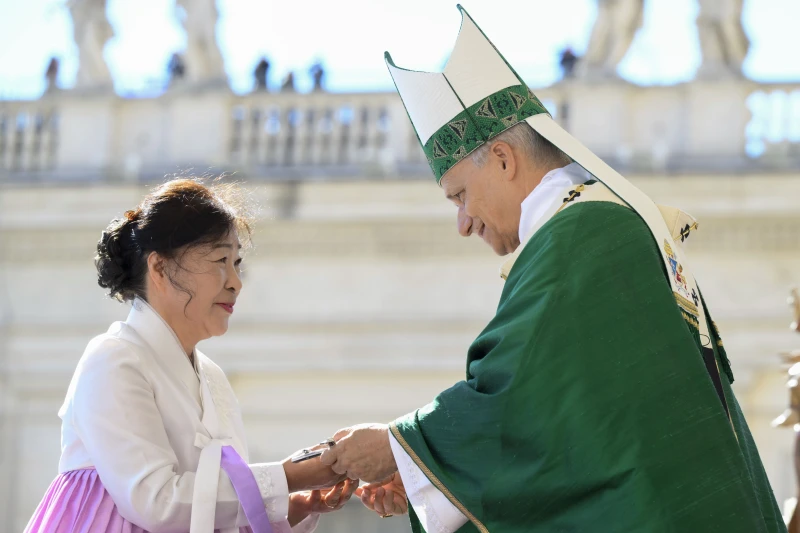

Vatican City, Sep 28, 2025 / 07:15 am (CNA).
Pope Leo XIV on Sunday entrusted the ministry of catechist to 39 men and women in St. Peter’s Square, personally handing each one a crucifix as a sign of their mission during the Jubilee of Catechists.
The candidates, representing several countries, were called by name and responded “Here I am” before receiving the crucifix. The rite took place during a Mass that highlighted both the vocation of teaching the faith and the Church’s universal call to hand it on.
Among those commissioned was Catherine Miles-Flynn, an American mother of eight who has lived in the United Arab Emirates since 1995. For two decades she has served as director of Christian formation in the Apostolic Vicariate of Southern Arabia. “There is a lot of joy in my work because I get to talk about Jesus all day,” she told reporters ahead of the jubilee, noting that Catholic churches in Abu Dhabi are “packed all the time.”
The Jubilee of Catechists is one of several thematic celebrations taking place during the Holy Year 2025, which has as its central theme hope. More than 20,000 pilgrims from 115 countries traveled to Rome for the weekend gathering, which included a prayer vigil in St. Peter’s Basilica and pilgrimages to the Holy Door before Sunday’s Mass.
Preaching in his homily on the parable of the rich man and Lazarus, the pope said that “the words of Jesus convey to us how God sees the world, at every moment and in every place.” He warned that the passage remains “very relevant today” as “at the doorstep of today’s opulence stands the misery of entire peoples, ravaged by war and exploitation.”
The pope reminded the catechists that their ministry is rooted in witness: “The name of your ministry comes from the Greek verb ‘katēchein,’ which means ‘to teach aloud, to make resound.’ This means that the catechist is a person of the word — a word that he or she pronounces with his or her own life. Just as we learned our mother tongue, so too the proclamation of the faith cannot be delegated to someone else; it happens where we live, above all in our homes, around the family table.”
Leo also described the catechism as a “travel guidebook” that protects believers from “individualism and discord” because it expresses the faith of the entire Church. He urged Christians not to fall into greed and indifference, saying the “many ‘Lazaruses’ of today remind us of Jesus’ words” and serve as a catechesis of conversion, forgiveness, and hope.
This story was first published by ACI Prensa, CNA’s Spanish-language news partner. It has been translated and adapted by CNA.
Read More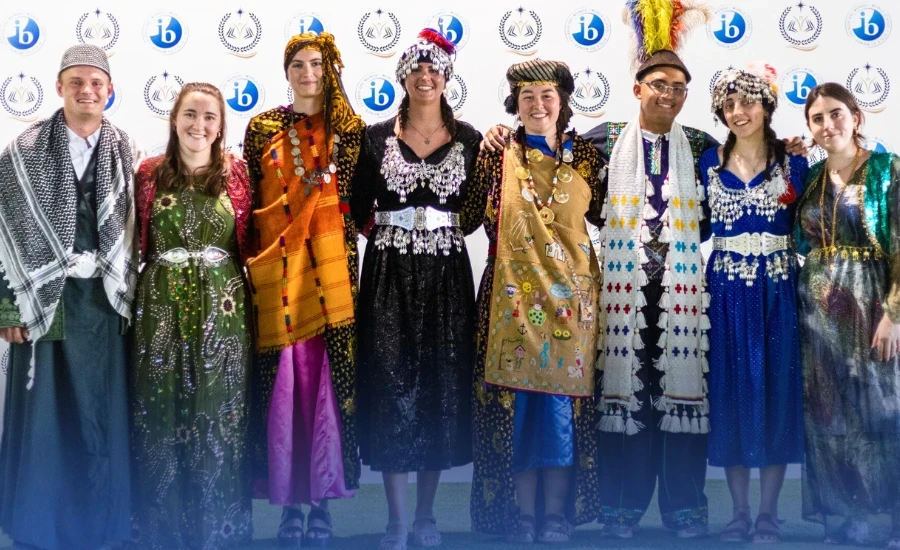

ACI MENA, Sep 28, 2025 / 07:00 am (CNA).
Every day people from around the world visit Iraq — some to explore an ancient civilization, others as tourists drawn to its natural beauty, and still others seeking work opportunities. But for one group of young Americans, experiencing Iraq has been especially unique, “filled with lessons, encounters, and blessings.”
After joining St. Thomas Mission, an initiative run in partnership with the Chaldean Catholic Archdiocese of Erbil in the Kurdistan Region of Iraq, Alex McKenna, along with fellow students from Ohio’s Franciscan University of Steubenville, arrived in Iraq to teach in the archdiocese’s schools and experience life and faith there.

At Mar Qardakh International School, the young adult missionaries engage in a wide variety of activities: teaching subjects like history and science, assisting in administration, and leading classes in English and religion.
“I didn’t know much about the Christians of Iraq or their lives beyond what the media reported about their suffering — especially during the ISIS invasion, when so many were forced from their homes to preserve their faith,” McKenna told ACI MENA, CNA’s Arabic-language news partner.
“In this mission, we work hard to strengthen Catholic education in a land that first received the Gospel in the first century, where Christians are still striving to hold on to their faith and identity despite many challenges. We pray that the light of Christ continues to shine in this holy land,” he said.

The St. Thomas Mission’s service emphasizes strengthening students’ faith first. Through their personal witness as committed Catholics, the missionaries hope their lives become a model of faith for the young people of Iraq.
“Some of my peers found the early days of teaching very difficult; it was a completely new experience for them, as it was for me. But over the years, I’ve learned from the children, from the teachers, and from the priests and bishop of the archdiocese how to draw closer to God,” McKenna said.
The missionaries’ service extends also to the Catholic University in Erbil, which McKenna called “a beacon of hope,” an institution fostering coexistence among religions and ethnicities in an environment of pluralism and dialogue, deeply rooted in Catholic values.
Living in Iraq has also brought unexpected joys. “We spent our holidays in what I would call educational trips more than tourism, where we experienced the generosity and hospitality of the Iraqi people,” McKenna said.
In Ankawa, the Christian neighborhood of Erbil, “the ringing of church bells calling people to prayer and Mass fills us with joy. Here, you truly sense the love, faith, and deep attachment to the Church.”
Although the Chaldean Church is in full communion with Rome, its liturgy is distinct from the Latin rite. For McKenna, attending Chaldean liturgies has been an unforgettable experience.
“It was extraordinary to pray in the very language spoken by Christ and to witness a liturgy that traces back to the earliest centuries of Christianity,” he explained.
Now in its fourth year, the St. Thomas Mission continues to serve the schools of the Erbil Archdiocese. For McKenna, the past three years of service have been a treasure, an experience he now carries with him as he begins graduate studies in law at The Catholic University of America in Washington, D.C. He said he hopes to return to Iraq one day.
This story was first published by ACI MENA, CNA’s Arabic-language news partner, and has been translated for and adapted by CNA.
Read More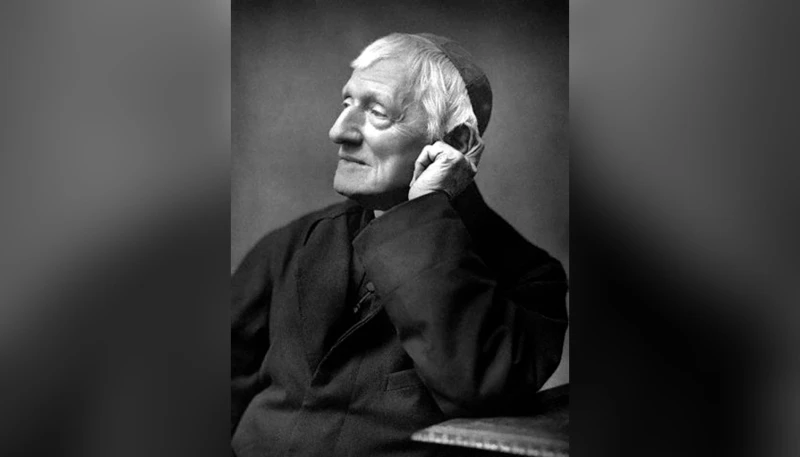

Vatican City, Sep 28, 2025 / 06:25 am (CNA).
Pope Leo XIV announced on Sunday that he will proclaim St. John Henry Newman a doctor of the Church on Nov. 1, the solemnity of All Saints.
“I will confer the title of doctor of the Church on St. John Henry Newman, who gave a decisive contribution to the renewal of theology and to understanding Christian doctrine in its development, in the context of the Jubilee of the World of Education,” the pope said after celebrating Mass for the Jubilee of Catechists in St. Peter’s Square.
With the proclamation, Newman will become the 38th doctor of the Church, joining a select group of saints recognized for their enduring contribution to Catholic theology and spirituality. He is especially noted for his insights on the development of doctrine and the role of conscience.
A 19th-century English theologian, Newman was first a renowned Anglican priest before entering the Catholic Church in 1845 under the guidance of Blessed Dominic Barberi. Ordained a Catholic priest two years later, he founded the Oratory of St. Philip Neri in England and was created a cardinal by Pope Leo XIII in 1879.
This story was first published by ACI Stampa, CNA’s Italian-language news partner. It has been translated and adapted by CNA.
Read MoreMy soul,
dilate thy heart;
thy Jesus can give thee every good gift;
He loves thee ardently.
Hope, then,
for great favours from this Lord,
Who, through an impulse of love,
comes to thee all love.
Yes, my Jesus, my hope,
I trust in Thy goodness,
that in giving Thyself to me this morning,
Thou wilt kindle in my poor soul
the flames of Thy pure love,
and of an ardent desire to please Thee,
that, from this day forward,
I may wish only what Thou wishest.
Amen.